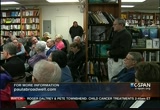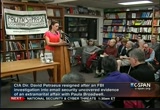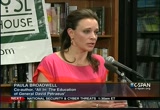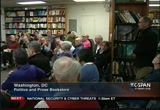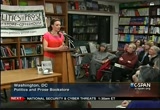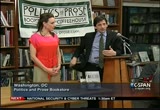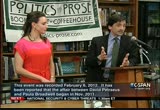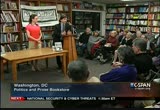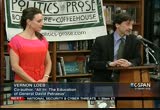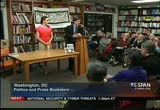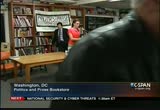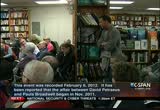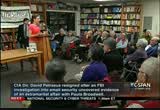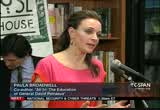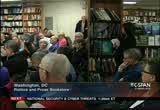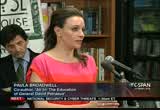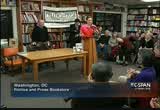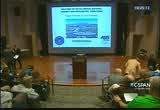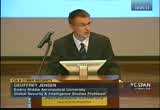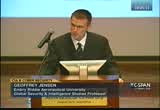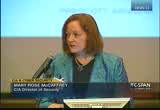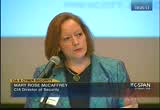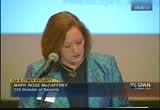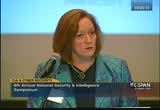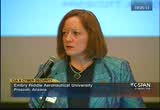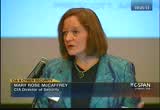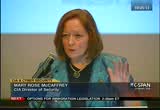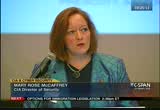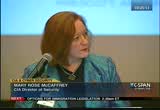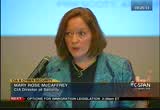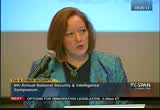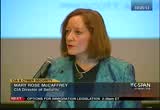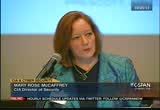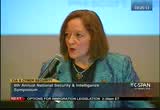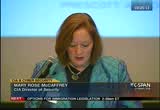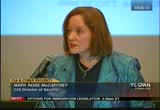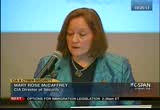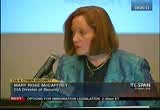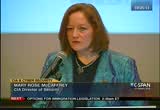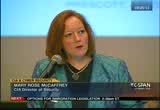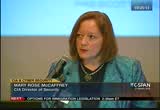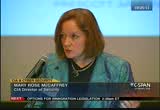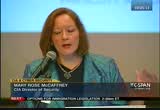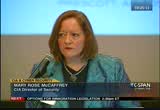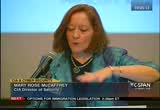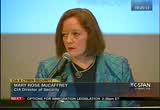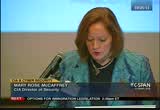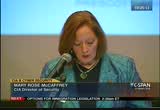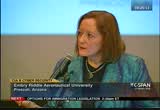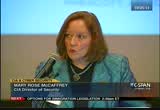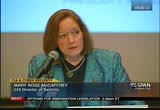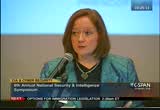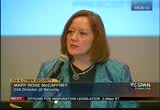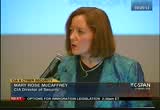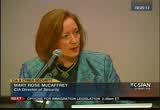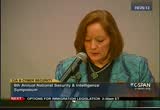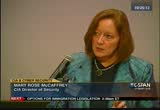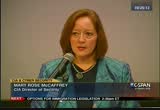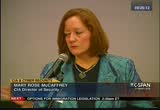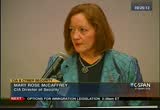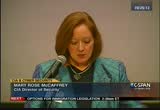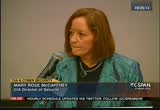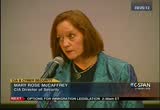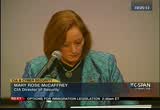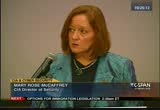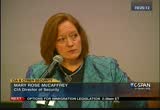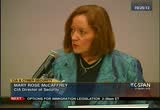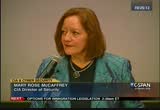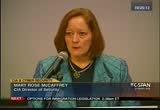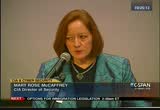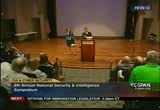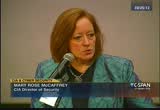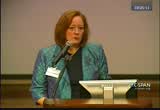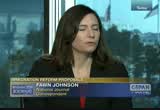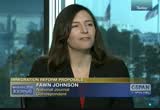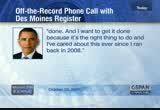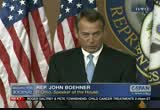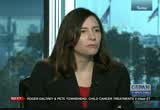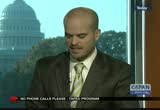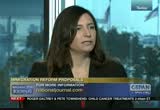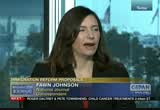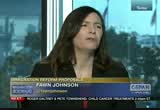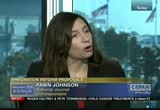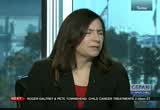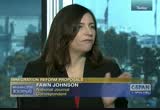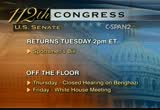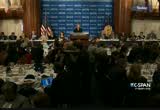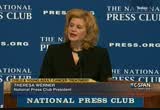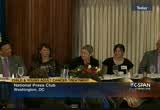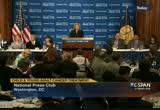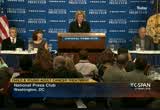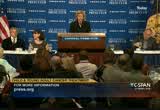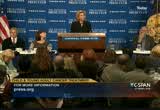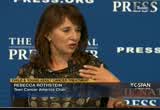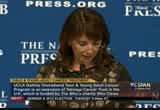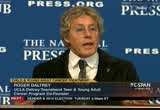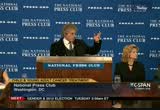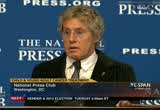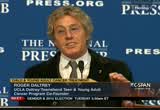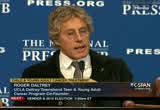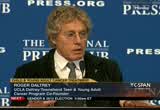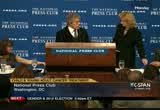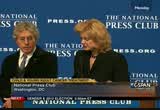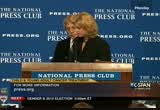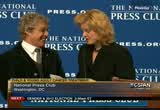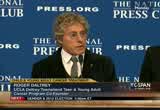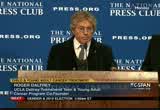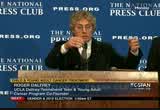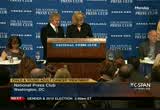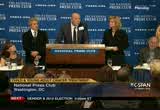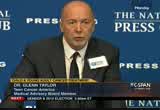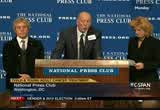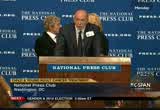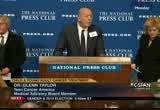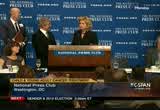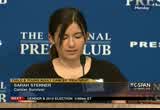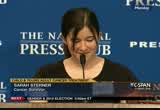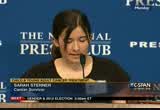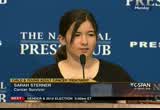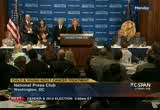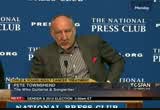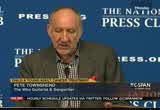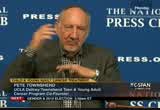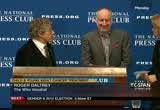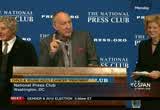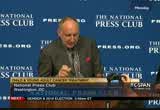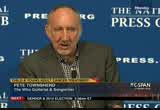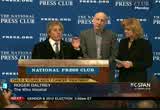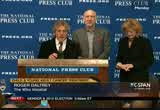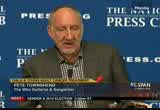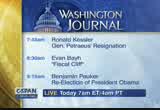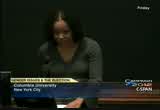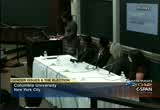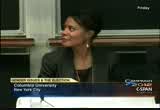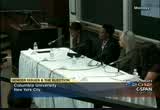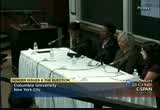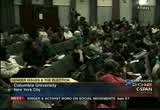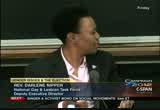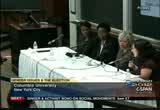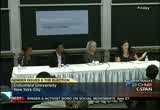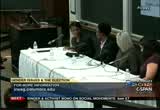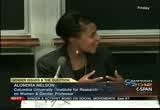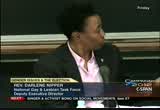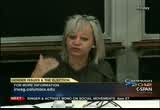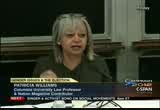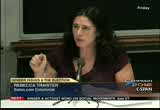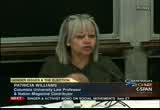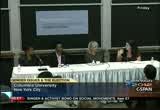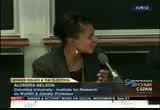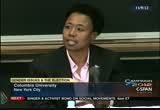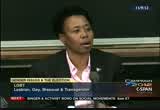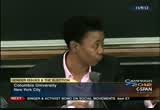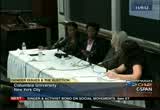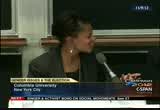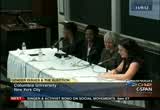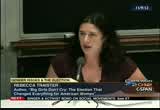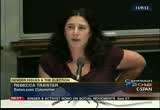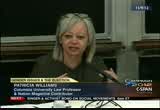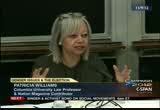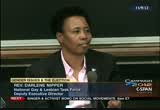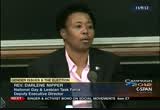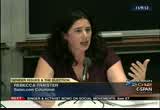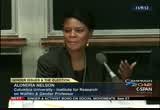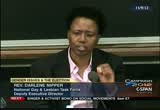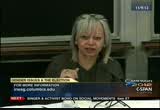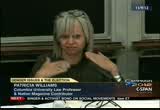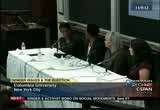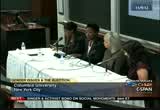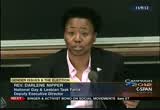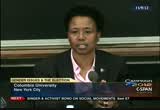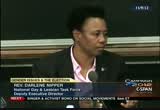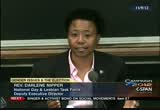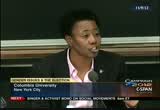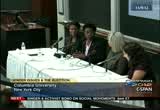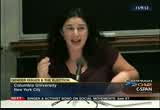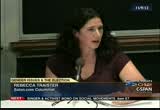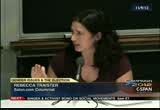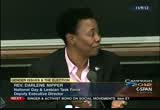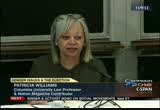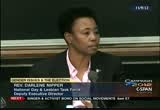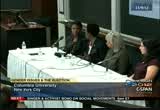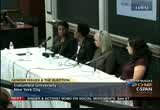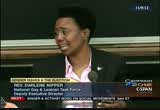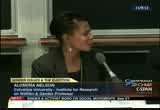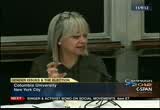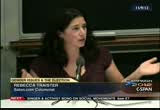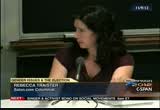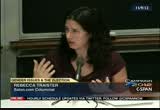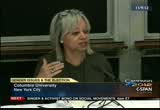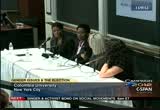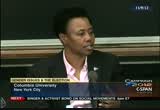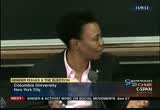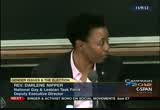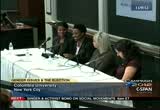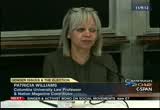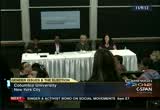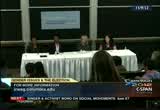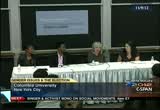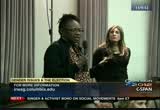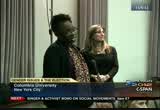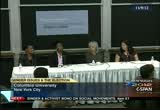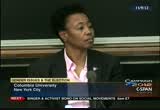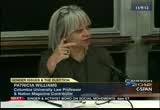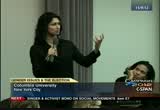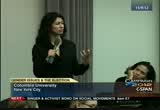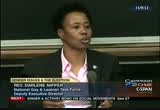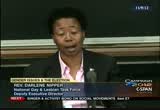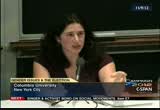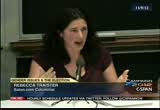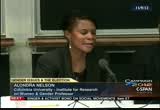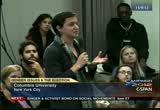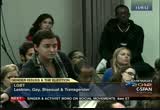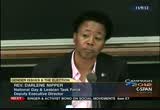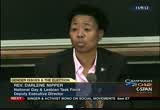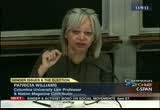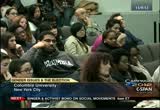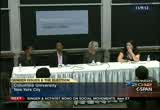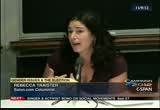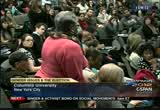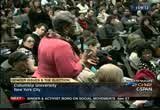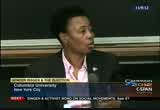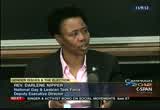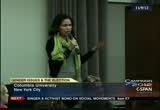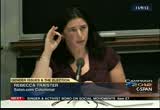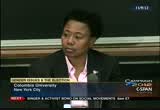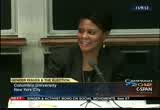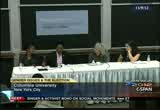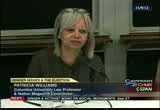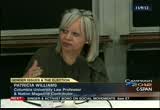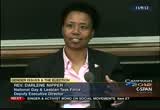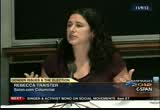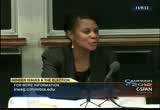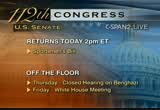tv Politics Public Policy Today CSPAN November 13, 2012 1:00am-6:00am EST
1:00 am
of which have not touched upon. or you have done so in passing and very scantily. it is the problem of corruption in governments at all levels in the middle east, proper security, and that involves the killers. the fanatic killers, the religious killers, the revenge killers, and the thug killers and hoyou deal with that. all it takes is one juror to create havoc in the community. also drugs and how you deal effectively with that. all those things play a role. unfortunately the military, the fitness report determines who gets promoted and that has sometimes less to do with ability but who likes you. >> is there one question there? >> that is putting substance to the makings of david petraeus. >> those are all good questions
1:01 am
and thoughts. to pontificate. i want to talk about the rule of law and this is one issue that brigadier-general mark martin was responsible for inraq in helping to galvanize in afghanistan. if you read the buckweed tree some of his efforts to show how very difficult it is and frankly, everyone who is involved said it would take a generation to change the culture there and to teach them our ways and is it right to teach them our ways? when you look at the competition with the taliban and sharia law and settling disputes, whether it is by cutting someone's hands off for stealing something, the government cannot do it, we have to start somewhere. martin said of this rule of law force and he went out to each of the -- down to the district level to set up the training teams that would teach the district level afghan officials
1:02 am
how to do speedy justice. their system is archaic. they're taking notes, pen and paper. they do not have a computer to share files on at a local level. there is a long way to go. one positive step they have made is this by a metric system. about two years ago and we started scanning any afghan employee or any insurgent so we could track them if they're coming into the system again. but rule of law in filling states is one of the most complex chalnges we will face anywhere we try to do nation- building. >> the rule of law there is not heavy as corpus but habeas corpse. politics is one jerks or future to create havoc in any community. >> thanks for your question.
1:03 am
>> congratulations on the book. can wait to read it. greg morrison -- mortenson got credit for innovative ways for building a country. the "the cups of tea" author. he was widely read about -- by the officers. there is a huge upsurge education and become an elementary schools and all that in afghanistan. does he get a lot of credit for that? ide have a role in inspiring that? >> is important to have room models to see what difference -- role models to see what
1:04 am
difference the activities can have. i do not know if he is necessarily galvanized that change. when we look awhat we have leard from iraq in earlier years in afghanistan, those engagements can help. the question is, how much does it help? this a matr for our national security? -- does this matter for our national security? that is we have to ask at the end of the day. >> i am interested in the art form of collaborative authorship. i wonder if you and your co- author could say a little bit about how all together you planned and executed this book. >> it is an art form. i have to say did the drywall and paula did all the hard work.
1:05 am
we were reporting a month behind real time. she woudld release this fire hose of information on me. i would run out the chapters and we had different story. it turned out to be a year in command and it turned out to be his last command. we had the blessing of the national front story which we digressed off. following that, i would basically run out the chapters and then it became a matter of passing drafts back and forth. i would produce a rough draft and she would refine it. and information i did not have or had not seen. the process sort of goes back and forth until a final draft emerged. and then it became even more collaborative when the editors at penguin, an editor got involved and the book was produced quite fast.
1:06 am
it was published on generate 24 and the last event ishe -- petraeus being sworn in by biden. senato6. it is six months. that is about how fast it can produce a but. you have to have a good relationship and good partner and trust. i find -- i am an eternal. i used to be a reporter. it is a combination of writing and editing from my vantage point. >> did you both deal with the editor and publisher? >> yes. >> thanks a lot. that is three interesting. >> one of my favorite parts of the book is petraeus is the dominant character and we have great access to him and it is told from his point of view but we established a group of secondary characters. three of them were the tenet
1:07 am
commanders who were commanding combat battalions so we tell the story of their war. one fodder on kandahar, one in the mountains of eastern afghanistan, and gazni province and they all intersected with petraeus. the fourth secondary character is here, doug oliphant. we have one of the lieutenant colonels here. the general's aid in bosnia? he was his aide during the invasion of iraq. harry was back in afghanistan -- and here he was back in afghanistan. it was the first time -- petraeus has a special relationship with the 101st because he commanded them in the
1:08 am
invasion of iraq. it was his first combat command. it so happened that the 101st was in afghanistan, deployed together for the first time since 2003. and david was one of t three combat leaders, italian leaders we write about. and it is cool that he is here. doug oliphant was the senior adviser. doug was also has kind of special relation to petraeus. he was the planner of the surge in iraq in 2007 when he was with the first cavalry division. it is great that they are here. i think if you read the book, you will enjoy that interplay between the dominant character, petraeus, and the secondary characters who are very
1:09 am
different and interested and very tough battles throughout the year. it really is a brutal war. writing about them from my vantage point was interesting and inspiring to me to see the kind of lives they led, being a non-military person, seeing their devotion and the way they carry [inaudible] from the people lost. >> two questions if i could. i wonder if you cover the political attack on the general as exemplified by the general "betray us" comment. could you speak about your cat experience at west point? >> we do touch on the "betray us" ad.
1:10 am
for those who have not read the book or know the other history, moveon.org took out an ad on the day that general petraeus was testifying in 2007 and there was a question about the veracity of the statistics he was using to report progress. this ad was meant to question whether it was petraeus oor "betray us." one of the most hurtful things he had was to have that. and we show the human side of him, the burden of command and a mask of command and how important is to keep that mask on to give the troops out. hes a human and is tough on s troops to be questioned at that point. the experience, i can talik for hours. in hindsight is wonderful.
1:11 am
i kept a journal of the four years i was there. i had a chance to look through those about three months ago and i think i did not have that great of an experience. it's etty much stopped. -- it pretty much sucked. i could add as a woman but it is hard for everyone. i am proud to be part of the long gray line. it was the most formative thing that ever happened to me. -- the most important thing was to embrace the concept of duty, honor, country and we show how this latest generation of young leaders are doing that as well. i will stop there. >> thank you for taking time today. i have it to a half part question. i will be quick. the first is regarding the other force of nature, richard holbrooke who lost and -- we lost and the relationship
1:12 am
between general petraeus and him. how did the afghans find general petraeus and the last half question is, among his many great strengths, what are some of his weaknesse thank you. >> thank you. great questions. a member of the parking -- brookings institute ran some statistics. he would say that petraeous as the defacto leader. he had -- even holbrook acknowledged that. your second question was the afghans. the interesting thing to juxtapose is david petraeus'
1:13 am
experience in iraq where they call him king david. maybe he gave himself the name, i do not know. he is very well respected. they have named a street after him. there are iraqis who would give up their children or riches to thank him for what he did for their country. afghans, not so much. this was much more complex terrain, counterinsurgency or insurgency. a very complex area. he had visited but he did not have the depth of knowledge, the networks, the architecture there that he uld have to work with, and not all -- and green forces. he felt he had to prove himself.
1:14 am
people are thinking this is not iraq. there are many principles and things we can transfer. i do not think he gained the report that mcchrystal had with karzai. the afghan ministers respected him but it was not the same level of respect he had with the iraqi government. the third question -- some of his weaknesses. he is such a driven individual. that can be a strength, too, obviously he channels that drive and ambition to serve the country. i think his ego is in line with that but it is not egotistical, it is egocentric, if that makes sense train he puts that duty
1:15 am
and service to his country but his family. i almost consider at the strength and weakness. my husband works really hard, too, he is clear and holly supported him and i have this wonderful marriage and established children. other weaknesses. i like to tease him, i call him mono-directional and not multifaceted. he is extremely well read. he reads a book a week and now he is into spirals novels -- spy novels. he does not like to do anything besides run and do pt and work and go out to dinner with holly. i feel like he could have more balance but it all comes down to
1:16 am
his voice in his head saying results, boy. his father in chapter 2. his father was very tough on him. his father had and it unfairly high standards and david petraeus could repce him so he was driven. whether it was planning on the soccer team, he was always driven to please his father and probably all of us could relate to that in some sense. >> i understand you are donating a portion of your perseids -- proceeds. i wonder if you could tell us about that organization and how you chose to support them. >> i would love to. the group is called team red, white, and blue. foundeby mike erwin. mike was an intelligence officer
1:17 am
but he had several tours in afghanistan. mike started this group to help when it wears find their new normal. through physical fitness -- and never studies show doing physical fitness helps to allay depression and suicidal tendencies but the other idea was to get wounded warrior something to belong to that they lost when they lost the esprit de corps of the military. you know what a family the military becomes. it becomes even more so when you have fought together and died and lost limbs or lost friends jointly and to lose that and come back and not able to discuss it with their family because they can relate or you feel shameful, wounded warriors that have been visibleounds such as posttraumatic stress disorder do not get a purple heart. i feel we're not recognizing that we have an epidemic right now in our veteran community. 472,000 veterans from iraq and
1:18 am
afghanistan haveebilitating levels of posttraumatic stress disorder and this is the number that have come forward. you can imagine there are tens of thousands more who are afrai to admit it. you get a stigma, it is difficult to get hired if you have these issues, traumatic brain injury is another invisible won't. i am working with the uso, making a video tomorrow to call americans to go all-out for troops. that does not just mean donating money. you will find ways to get active and to mentor some of these wounded warriors. if you cannot run a race with them, maybe you can pelt online, raising awareness, posting on facebook, whatever. in whatever way you can, welcome them back and try to reach out to them. and give them thanks for what they have sacrificed for us. >> elect to go back to the
1:19 am
afghanistan matt. -- i would like to go back to the afghanistan matter. i wonder about the application of the iraq search idea to us -- to afghanistan. a major part of the iraq idea was buying of local leaders. we have been buying off warlords in afghanistan for ever. and the taliban have access to limited resources from the drug trade. dess petraeus relief bill that the search idea could be plucked from iraq and put down in afghanistan and feel successful? >> no. what the surge was meant to do in both countries is you create the time and space so that the local host nation, national security forces could stand up and defend themselves. you have to deal with -- it is
1:20 am
not just a security solution. there is the rule of law were talking about, international relations, you have to get a lot of partners, 49 members to agree objectives.ed you have to find out who has to deal with drug operations. you can imagine the complex discussions. i do not think he thinks there is a solution in either country. especially if we have a withdrawal in afghanistan. we have given the iraqis a chance -- he gave maliki a piure of george washington. this is your chance. we have created this time and space, it is your chance to be there at a new beginning. nobody knows how these wars are
1:21 am
going to end and i do not think he was naive to think the surge would be enough. >> , questions? >> we have five more minutes. we get one and three-quarters. >> i will limit it to the cia situation. how much of esident obama's interest in having him go somewhere was political to get him out of the way? you know what i am talking about. the their party is part from question in part from concern. you mentioned that he was a great consumer of intelligence. on the other hand, it appears to me, who is a newspaper reader, that there is a militarization of the cia going on. that is the core underneath my
1:22 am
question and he was selected in part because of his special operations background and his use of all those kinds of devices in order to move this process within the cia further that has been in the past which should be ofome concern. if you could comment on that i would appreciate it. >> he has not talked to much about the direction the agency is going in. but if y look at open source reporting, since he has come in to the agency and the number of months he has been there, five months he has been there, there have been more drawn strikes than the five months under secretary penev. there have been -- secretary panetta. they have been more effective. some of the strikes have gone down lately. i do n know how to read into
1:23 am
that. does that necessarily mean we're increasing that pair militarization -- paramilirization of the agency? petraeus suggested this ca position and gates embraced it in november and december and did not ta to obama about it until january. the first time they talk about the position was in march. the president had been mulling it over. i never got the sense from him, from the president, from petrae or anyone on the national securit council that he would be put there to militarize the agency. petraeus is thinking how the defense department is shying away from this large scale boots on the ground operation and gates said the next leader who decides to commit to one of these operations should have their friend -- heads examined.
1:24 am
petraeus is thinking even if -- as he goes to the agency, that is the future of warfare. i would be speculating if i guess the president had an intention of turning the agency into an oss. they are keeping up their drone tacks and they are showing some effectiveness. they have lower collateral damage. important, we do not want to create more enemies. we will have to wait and see. the challenge is the transparency there and we do not have a lot of information on what they are achieving. >> my question is about the personal relationships you highlight. you mentioned there was a lack
1:25 am
of a conducive working relationship. general petraeus did make the executive decision to do one-on- one meetings without karzai. you also mentioned that petraeus stressed the importance of military partnerships. i am wondering about your reflections as to how that came into play, was that the right call? the overall picture of that. >> i think one of the things he learned in his education was how critical it is to have unity of effort with the civilian side. you cannot kill your way out of an insurgency. it needs to be a comprehensive, civil military plan, ideally a whole government effort. the search of security forces arrived but we never did see a surge of civilian forces and that was pretty frustrating to him but he found innovative ways to work around that.
1:26 am
one of the ways i would like to from the book is is a study in strategic leadership. how to get it done when you have a troop capt. if you want to have this afghan operation.ce efficien he brought in infantry to augment the special forces. there is some need examples of strategic leadership. i think in his dealing with karzaihe realized any time he brought general haitham barre -- ikenberry. petraeus maintained a good relationship with ikenberry. when you speak to the staff there is -- you understand there's a little bit of tension. i did not write about this in the book except to say that when petraeus left that day he found
1:27 am
he was taking the job, he was writing notes in his notebook. one of the first people he wanted to call after holly was william crocker, his former partner in iraq and he did call crocker and crocker was interested in joining him. they made a lot of calls to get crocker there right away, to have this dynamic duo that worked so well together. and crocker did not get there till a year later but you wonder, would it have made a difference? we will never know. no more questions? >> thank you. because we're in politics and prose, i have to ask about future possibilities. is there any role in politics as time goes on? >> did you watch "the daily show" a weekend half ago? -- a week and a half ago. jon stewart asked the same
1:28 am
qution. my husband says he should say he is running for office because i will sell morbooks. i cannot tell lies. he is not interested. as a mentor of mine, i have mentioned my interest in running for office. he said politics krupps absolutely. you have seen some of these individuals -- corrupts absolutely. you have seen some of these individuals. there would stand him in the back in and instead to a dance their political agenda and he kes that personally. he does not want to be like that. he would -- if he ran for office he would have to yield on his principles to win the primaries. to win a personal voters. i do not think so. he is electable by either party. people admire that he is a values-oriented individual.
1:29 am
some of the mattrs he would subscribe to -- values he would subscribe to. he would be great but i do not think hit is going to happen. teenager, he is so excited about the agency. in the military there is a lot of brawn. ateart, he is a professor. one of the things he talks about is becoming -- and to academia. thanks for coming. this is very exciting. it is an honor to be at the most prestigious bookstore in
1:30 am
washington. i hope you support that and keep this bookstore thriving. and also another shout out to those who serve "book tv,"watching and coverage of events. it gives me an opportunity to consume the news information and make my own mind up about what is going on. c-span is a great way to get an unfiltered view of the day's events. >> he watches c-span on comcast. c-span, created by america's cable company in 1979. brought to you as a public service by your television provider.
1:31 am
>> cia's security director, mary rose mccaffrey. she spoke at embry-riddle aeronautical university in prescott, arizona, a couple weeks ago. this is an hour. >> if we can make our way to our seats, please. welcome back to the eighth annual global security and intelligence symposium here at embry-riddle aeronautical university in prescott, arizona. i am an assistant professor with the university, all with the department of global security and intelligence studies. it is my honor to introduce an
1:32 am
important woman, not just because she is a woman but because of her position in the security and intelligence world. mary rose mccaffrey. she was named a director of security for the cia in september 2011. pryor, she was the deputy director of security for the cia. director of security and counterintelligence in the national reconnaissance office. prior to that, she had several terms and stops from the dod, u.s. navy and the office of the director of national intelligence. embry-riddle aeronautical she has worked policy analysis, operations, information security, you name it. she went to a small school in
1:33 am
vermont, st. michael's college. means she is a purple light. she is a purple knight. please give her a warm round. ound. ms. mary rose mccaffrey. >> can everybody hear me? i was asking if everybody thought i was giving out halloween candy for such a full audience. i want to thank each of you for coming out today. i know school is much more important than listening to me. for those who came from the industry, thank you for taking time out of your busy days. i have had an extraordinary morning with your students. i am very optimistic about our future. because each of you give me
1:34 am
great faith that whatever challenges the intelligence community, the national security of the united states face, we are well poised and postured to address them, at the turn them, and figure out the solutions. so take you very much for the invitation. second data point -- even in the intelligence community, they are getting to a point in time with a gender bias is being corrected. i am, after 65 years, the first female director of security for any intelligence community agency. [applause] >> as many of you had asked, but we ask what you wanted to do with your life, just two words of wisdom -- my parents died before they ever knew i had a buildup because i kept moving jobs. so when i tell you it is just a stop on the way. if you give whatever your
1:35 am
employer is 100% of their passion, 100% of their work ethic and 100% of contributing to their mission, you will always be happy in your job in the next job will find you before you find it. fear not. there is a long road ahead of you. i am absolutely thrilled to be here. senior national security symposium. ipod -- a plot academic institutions like embery riddle for sponsoring such an event. cyber intelligence is just a new world of intelligence for the community. national security is absolutely critical to the united states defense, our ability to operate globally and universities like this will help us get to where we need to be. the skills we need tomorrow are very different than the skills we have today. that is why i was pleased when i was asked to come out and join you today.
1:36 am
you will help us develop the next generation of cyber security professionals and he will help us protect our cyber security assets and our nation's infrastructure. cyber attacks have increased dramatically and significantly over the last decade. i can tell you for a fact that the cia.gove gets 1 million hits a year. that is a lot of people try to come into your system, whether it be for good or bad purposes. your development of becoming a professional in this business will be fundamental to our future. so when you're having a hard time with the professor, a hard time with a course, everyone of their professors is here to help you succeed. much like the mentors you have along the way. your internships, you keep looking for the stars. you will find them. let me step back a little bit. we are talking about cyber today but i need to deviate
1:37 am
history of why cyber is so critical. if you remember, world war ii was a turning point for us. december 7, 1941, was the day of infamy. it was followed by many long years of the cold world -- war. most of you are too young to remember your parents are grandparents -- we used to have drills. when the alarms would go off, you get under desks. this thing called a nuclear threat was a real problem. but during those days, the cold war really focused on russia and the united states. two powerhouses. so fast toward, you have a vietnam. many of you may have served in vietnam. then you fast forward and we were going to have russia, the berlin wall came down.
1:38 am
we were going to get some benefits of that peace dividend. peace dividend in the intelligence community was multiple stance. so picky stand, they became a challenge in terms of one's ability of government, stability of resources and data we know about those particular companies. move on forward, 9/11 happens. everyone of you in this room remembers where you work. i was on the steps of the pentagon. i literally walked out of the building and was there for a meeting and i remember hearing on that gorgeous day an eerie sound. it was like a plane took a wrong turn but i did not know it was a plane. because planes go up and down the potomac regularly. the next thing i knew, i was on the bottom of the stairs and i'm thinking how they get from the top to the bottom of the stairs? the plane had hit the building. i did not know where i was
1:39 am
sitting at that point and time that two other planes had hit the world trade center. because, if you remember, in a lot of our jobs, we have cnn or span = = or cspan but i did not have it on. by first reaction was i just ran my pantyhose and i have to brief a general. this is not a good sign. my second reaction was there is a lot of smoke coming out of that building. one of the privileges i had is parking. very few get parking at the pentagon. the reality is i ran to my car, got people out of that building up from the point on, our world and the united states and around the world has changed. cyber has taken a huge role and place in the world since.
1:40 am
we entered into a global war on terror, started in afghanistan, went to iraq, back to afghanistan. there will still be peacekeeping troops and they are huge challenges about stability of government and stability's and our roles as that of those countries. we will continue to adjust would need to be done but none of that is done without our dependence and involvement in the cyberworld. technology drives everything we do the world wide web has made us more interconnected than at any time in our human history. the vast majority of our emperor structure resides in private sector. let me repeat that. the vast majority of our infrastructure in the united states reside in the private sector. the national security risks and
1:41 am
economic risks are still with the private sector. the government does not do it alone. they do it in concert with all of our partners. our partners of the private sector. for those, but the work of the government or private sector, you can contribute no matter where you are in whatever your professional desired is. this private sector holds a lot of data. these assets are pretty profound. their protection to the united states priorities is of national importance. the president declared recently, and i quote, here is a list of priorities, this is in the top five. the cyber threat is one of the most serious economic and national security challenges we face as a nation and america's economic prosperity in the 21st century will depend on cyber security. the united states does have a huge challenge. in that we have a much larger
1:42 am
body of sensitive and potentially damaging information to protect the most countries of the world. think about that. we have more and permission than most countries of the world. we will hear why that is important later. the cia's primary job is -- role in the protection of our own systems is paramount but our real primary role in the cyber world is to inform the policy maker and to inform the decision makers on what they are to do next. we determine capabilities, we determined intent, and the conduct all source analysis in both hard copy, open source, classified, and the cyber environment, to inform these said policy-makers and defenders
1:43 am
of the cyber threat. there are four big players -- dhs, responsible for the u.s. infrastructure in terms of how we are protecting our homeland. the fbi does have the law enforcement peace. those here this morning and know exactly why they have that. nsa, also known as cyber command, has the cyber command to drive the entire structure and the policies by which we are going to deploy various networks around the world. cia doesn't do that work but we can't do our work without collaborating am working with each of them. despite the fact that sometimes the matter what the news says, you do not do this alone. we do it with all our partners in the public and private sector. cia does partner with our agencies. we do, i heard a lot about for each of you, you talked about co-ops, internships,
1:44 am
opportunities. the partner with these agencies to leverage our own employees and prospective employees to get the best match for the person. we are investing in the future and the future is you. at some point, i will find a beach somewhere but at some point, you will all be in my job. it is important for us to leverage our partners private and public to get the best officer recant for the challenges we have. we recognize that we did not hold all the critical information and be recognized that the partnership between government, public, private, law enforcement, tribal, many of you probably never hope -- heard those words prior to 9/11. we did not necessarily worry about that. we operated in silos of excellence. cia did stuff billy well.
1:45 am
an essay it up really well. -- nsa did stuff really well. we can afford to operate separately. the partnerships have been absolutely critical to each of our individual successes. we have to operate in a federated of registering the sicker -- secure our cyber and infrastructure. all of you probably heard after 9/11 and any time there is a crisis around the world, did they communicate with one another? did the policy leaders and an agency , did they talk to one another? i can assure you they are talking pretty regularly. you have to rely upon one another because there is not infinite money, people, and
1:46 am
opportunity to put the problem set in front of every agency. if you put the problem set in front of them all and they all worked their peace, you get a better and products. we have to make sure that what we share, how we share it, and when we share it is just in time. you cannot afford to have somebody find out information after the fact. the track record is pretty good people actually sharing information. you also have to remember each of these agencies, in the director of national intelligence, there are 16 agencies. 16 agencies to all have a specific function to provide information to the president and policymakers. they all have a mission to do. there is always a balance going on. often one of the questions i will get from the audience is in
1:47 am
the business of intelligence and specifically be the director of security, what keeps you up at night? well, there is a lot. i am always worried about people. because it does not matter where you work or what you do. everything we do involve people. i am always worried about people in harm's way. my second big word is cyber. in the last 10 years, i have been called out the dead more times because somebody tried to attack the fire walls, somebody had a spear fishing attack, somebody had -- every once in awhile we have to figure out if it is volume are somebody trying to take it down. everyone of you has the least one phone in your pocket today. in every one of those phones is a wonderful tool three bills
1:48 am
tools can also be used to our benefit. -- has a wonderful tool and each of those tools can also be used to our benefit. it's cia's business -- if it permission get exposed, much like it did in wikileaks, people are affected. that is not a good thing. cyber espionage, much like prostitution, is probably not as old as prostitution but it is growing as fast as it does. him in trafficking, you have to put it in perspective. it is a potentially profitable business. why build it if you can steal it? if you are a banking industry, why worry abut your competitors
1:49 am
if you can in essence put something on their systems and just copy it? it is just an extension of espionage for us. that is how we look at it. it is the infestation -- infil tration. the goal of cyber espionage is to attack the availability of our systems and data. i think we all know how devastating the impact to our nation would be if certain information fell into the wrong hands. or the impact post wikileaks. we also know the challenges we face in protecting this information. it is not an easy feat given the level of the sophistication of both the technology, our
1:50 am
adversaries, and the non melissa adversary. so who are our adversaries and what are their motives? they run a full spectrum. it can be singles -- or you can have single individuals who do you agree to allow harm. the special agent this morning was talking about anonymous trade movement and a very different shapes. they are like an amoeba. they can change depending on t he -- the flavor of the day. we have lots of criminal organizations to . how much money do you think would be lost if the drug cartels went out of business? every drug cartel has multiple phones and some cards -- and sim
1:51 am
cards. it's a very profitable business. we have structured units within state sponsored organizations. we have non state sponsored organizations. think about the arab uprising last summer. it started with a fruit vendor in tunis. he was tired of getting shaken down by the local guy on the corner. because the at the same spot, he supported a family, his father had been killed. and he supported his family by selling fruit every day. every day he -- every day they took more money.
1:52 am
it, did. he has a list of priorities. it is like the early days of the mafia in the united states, and he got tired of it one day, and that is the power of one. he went to the government to take orders, and he let himself on fire, and he started an arab uprising, and everyone of those countries that figured if he did do it, we could do it, did. there are a lot of other things going on, but think about it. autocratic, dictatorial governments are overthrown by the power of one, and it was all the as cellphone. -- via cell phones. there were a lot of organizations, but it was all the as cellphone. -- it all via cellphone. it is important to understand the power of what technology can do for good and for bad. we have a lot of folks trying to disrupt u.s. networks, and that is not just government networks. that is u.s. networks.
1:53 am
everyone of the companies, they all run on networks. the proprietary information is protected on those networks. they build things. every one of the satellite was built in a proprietary environment. it was protected. these are different challenges we face and they face. those adversaries have by huge access to a wide range of capabilities, and they can leverage and repackage publicly available tools. some of our students are showing some of the tools that are available but they have access to, but publicly available tool kits repackaged can do a great deal of harm, and they share these tool kits. they have an underground community better than most. these attackers will dedicate resources to finding new exploit its to things -- new exploit its
1:54 am
to things the government has been able to detect and deter. the reality is our job is to anticipate, but when you cannot anticipate, you have to figure out how can i get ahead of it the next time? how do i get beyond whether it is signature-based, tool-based, spear-fishing, a targeted attack, and if i cannot get beyond it, how do i defend against sin? how do i make my network robust enough to defend it from someone who wants to do it harm? they use a lot of information we produce. your company, the intelligence community, the open source administration, facebook, twitter.
1:55 am
i have a 20-year-old niece who just got out of college, and i sent her a message, and she said, that is funny. it is instagram now. oh man, am i getting old. think about the means of communication you do not call your parents on that. i see some nodding heads. remember, how tight that uses facebook, twitter -- al qaeda uses facebook and winter as a recruiting tool. do you know who you are talking to? just think about how people can play in environments that are so open. they used forums like us. there is not one day when i do not get 500 linkedin requests.
1:56 am
there is not one day somebody does not send me something to be a facebook friend. unless i know you, i am not clicking. now they can use technology advances. on many ipad came out. -- a mini ipad came out. think about how many people in that room were not part of apple. i was talking to one of the vendors for apple, and they were telling me when a new product comes out they do not see it until the rest of the world sees it, and they hurry to get the product on the street, but apple has figured it out. that technology is goal to them,
1:57 am
so they have to pay attention to protecting it. they use academics. of fair number of academia come from foreign countries. we have the best school system in the world, and every country knows it, so you are very fortunate to have the best school system. there are a lot of chateau cos, a lot of people who think you're buying something, and they are buying something else, or they are buying fashion and selling it. the motives stand in the spectrum. they can be technology. can you imagine if somebody got the technology, they would not have to spend the billions we spend on the fence? in the end, it is all money. they were talking about the occupy wall street. at the white house, there are times it is not a great place to go to, but where they were was literally right across there, so you have to go find these people before you go to work, and it
1:58 am
was an adventure. the goal may starts innocent, but disruption is the goal. there can be damages. the damage to washington, d.c., was greater than the opposition, but the damage caused the taxpayers a lot of money. they go after institutions, but they also go after people. last week which had an event where we all get notified our name had been pulled together by in who a particular target her and they had started to do some targeting. you can target me all you want, but for some other people, that is a real problem.
1:59 am
you can target me all you want, but for some other people, that is a real problem. they will go after the easy stuff, but they are also going to go after the hard things. they will go after those accounts they think they can get a big bang for the buck. a satellite will scoop up a lot of data. it is only when they actually tell you what is on the satellite, but these guys can scoop up a lot of information. private industry supports the government in everything we do. we have all whole series of laws and executive orders that require us to protect our data. the industry does not have the same set of executive orders. there is a bottom-line. they do go after industry. they go after -- it is a political season.
2:00 am
we are seven days away from an election, and the world is just crazy. they are going to go after single individuals. soon after 9-11, they went after a couple of individuals who have retired and become public figures, so they went after them. that becomes a real problem for their family. it starts innocent, but it does not always end innocent. some of the ways the cia has to worry about is primarily. we worry about computer network exploitation, and we worry about a computer network attack, and the reason i say that, i spend a lot of time and money -- say a great computer network exploitation as traditional cyber espionage.
2:01 am
that becomes sport for many foreign intelligence agencies. they want to break in, steel, or modify the information on our system. they seek covert integration or access to our data as being the primary objective, because wouldn't it be nice if somebody knew what the director or president were going to do before he were going to do it, and that is what cyber espionage does for us. everyone of the companies who builds, appliances to build firmware, who build operating systems, there is always a first, and in every version, there is a vulnerability, so sometimes those provide a wonderful opportunities for disruption. you can imagine the u.s. government works closely with
2:02 am
companies like apple, microsoft, oracle, primarily because everybody uses the technology, so much like they do, we fix it, so we have a very robust system of patching. we have are robust system, and you will have to get through more than one player to get to our system, but it is something we worry about. we worry pretty dramatically. according to a recent study sysco came up with, the number of devices such as your smartphones and ipads, they are going to literally exceed 25 billion by 2015.
2:03 am
i am not sure a lot of infrastructure is going to exceed that, but those devices will. that has huge implications for the entire united states. not only how we work, where we work. folks worry about somebody wanting to alter or disrupt the availability of our system, the integrity of our system, or the data. the dni have 16 organizations, and they share across a computer. anyone can look for a hole in it. we get lots of fishing attacks. we do fishing attacks on our own employees. you may think everybody who is old, anybody over the age of 30 never makes a mistake. we do phishing attacks on our
2:04 am
employees. every year and now from 1000 to 5000 click on it. the first one i sent a reminder and says, do you know who is clicking on that? the second time i want to say, are you stupid? the third time, we show them how to use their computers. the first thing you know for any organization is password strong. they get a set of rules about how to work in that environment, and every year we have more than a handful of people who seem to miss it. some of them are the rocket scientists, and they are so busy creating something, they
2:05 am
are like, i just did not think. we have spear fishing that hits a lot of our principles. you know that david petraeus has been our director for a little over a year. he is a retired army guy who spent a fair bit of the last decade overseas. he is a visible guy. he is so visible every day we scan his computer, because he has classified computers and unclassified, and the unclassified computers are how he connects. every day he gets one from some country or some person, he has no idea who they are. we will say, just remember. do not click on them until you know who they are. he says, what if they need me? everybody gets educated.
2:06 am
he has been educated and is so good at this, but even fourstars have a lot to learn. we have a lot of folks who live and work in the field, so they have a lot of the same smartphones you do. every once in awhile they'd put a lot of pieces of data that may not be classified, but it is their buddies in the embassy, their bodies in the foreign service, their buddies they work with, and it is not unlike somebody driving down the street to attach something to the iphone. it is not hard to do. everything on the system becomes suspect.
2:07 am
we have compromised assets because somebody got to be a personal friend and somebody picked it up. we have to understand our business is not about what is convenient. it is everything you say and do has an impact, and that is important. everybody is worried about service attacks. the biggest were to the u.s. financial institutions. early in october, there was a whole bunch of the institutions, they thought it was just a fishing account, but it was a certain denial of services attack not on multiple institutions. it might have been a week, an hour, a couple of days.
2:08 am
the banks were not so worried, because the bank is not concerned about his own, but collectively, it has a huge impact. the banks have done similar things the intelligence community has done, to worry about what are you seeing on your network, because how many of you cannot imagine going to an atm -- not being able to go to an atm or to pay the bills. that was an important thing in october. the suspected attackers, it is suspected to be a state sponsor, but there is reporting all over the map. it did open the eyes of the banking industry, where we are talking trillions of dollars. each and everyone of you has an account in one of these banks. everyone of them got affected. abc recently reported a targeted malware attack. it will go after one of our directors who does a lot of work outside the organization, and
2:09 am
in essence, those tool kits, it took about four or five different tool kits. it was able to take screen shots of everything they were doing, and in an environment like this, nobody cares about the audio, but in the white house, that is a big deal, so when the director goes to the white house to give a daily brief, the last thing he can afford is to have somebody with an audio capability on the ipad he is using to give the president his brief. it takes everything on that computer.
2:10 am
we have a very good offensive operation. your best defense is what you learn from your offensive folks, so we have the luxury of offensive folks to help us with defense, and so for the military, you have the same scenario. you had better figure out how to detect it and toward it. we have another concern we were talking about at lunch. june, july last summer, we had a huge storm that came across the east coast. it rained so hard, and there was so much wind. it was like being in chances. it was like the wizard of oz movie, and what happened is literally the power went out in
2:11 am
the mid atlantic to 3 million people. that is a lot of people. think about this. the power went out in the mid- atlantic to 3 million people. that is a lot of people. i work at a pretty prestigious organization. it has generators, power plants, back up to generators. our power went out for 24 hours. cannot really afford to have the president's eyes and ears power go out for 24 hours. virginia power, who gives us the primary feed, had lost power everywhere. you come back in order of priority. hospitals first. we were not the first priority. we do have the capacity, part of the work force could work. the others could not.
2:12 am
they were working round-the- clock to take trees down. i do not think we got power for 10 days. the damage in about an hour was pretty devastating. think about it. auditorium, heating, cooling, power, all dependent on a computer network. everyone of you are dependent on a computer network that operates. if somebody wanted to do harm to those, what would be the impact? think about that. we think about that, we have a population that wants to bring their own devices into the workplace. we do not let you. we are doing a lot of things to try to overcome that. we have a number of wireless things. we have gaggles of ipads. we do things to the ipad so they do not become a listening device.
2:13 am
the challenge is when you were taking that ipad was classified information, what happens to it? the trust that the person is not handing it to someone who has ill intent? it is an interesting set of challenges. there is a lot of things and we're working through. think about that which operates your home. there were very concerned a couple of years ago about al qaeda coming after the power companies, the electrical grid in the united states. electricity companies are pretty well prepared for that. i am giving you a lot of doom and gloom, but it is not all that bad. you are the best and brightest.
2:14 am
a lot of really smart people, when you decide what you want to do, will join you in protecting our networks both in traditional ways, non-traditional ways, and in innovation with technology that will help us develop new defensive platforms, processes, and we also have to look at the personnel. the technology, the cyber folks we hired 10 years ago are not going to be the people we need for the future. the folks that that hired when i got hired, we all grew up with a series of different technologies. early days, it was like a word processor. i am speaking to each and every one of you here today.
2:15 am
i will rely upon your talents, your ingenuity, were being able to think outside the box. you can think outside the box, but you have to work within a contract to ensure that what you are doing balances with the mission need of whoever you are working for. it does not matter whether your building planes for boeing, the software for apple. or you are working for the u.s. government. the ability for us to operate securely will be depended upon you. it will be dependent upon what you bring to the table to one form of those that you work for how to get beyond the problem at hand. there is a lot of intelligence partnerships going on today. are they all they need to be? no.
2:16 am
a lot of private industry- government sharing going on today. i will tell you that every time we have an incident, i have a team that spends a lot of time figuring out post-mortem, how did it happen? what was the impact? how do we make sure it does not happen again? the real lesson here is not that we're not going to get ahead. it is that when you get hit, what do you lose and what you learn from that? how do you ensure that you do not get hit the same way? each one of you has that lesson in multiple ways. first time you did something silly or not so smart and your parents caught you, what did you learn from that? the first time you went to college and you spend that first semester playing too much, what did you learn? we continue to have to look at
2:17 am
every attack as a new attack. even if it is an attack we have seen before, we looked at it as a new attack. some of our wonderful folks worked in threes. if you look at some of the activities going on in war zones, bombs come in threes. suicide truck, a bomb that comes up, you always have to be careful of the third. we can dodge multiple damage assessment to determine whether our methods of protection and our defense are adequate. sometimes we find out they're not and we have to do something about it.
2:18 am
furthermore, we have to strengthen every link in the chain. we were chatting about supply chain, everything got outsourced in the 1990's. a lot of it that outsourced to china. do you know where the widget or the piece comes from? was it was modified? we worry about supply chain. we have a lot of people working on supply chain. we put our supply chain people, our network defenders, all in wonderful, what i would call red team-black team environments. i was laughing earlier about the lab with the computers. by attacking ourselves, we learn more to be able to defend ourselves. by mitigating the element of surprise.
2:19 am
mother nature is a pretty powerful character. all other elements of surprise, most of the problems we have our because people do not pay attention. we were talking about passwords this morning. so many simple things you can do to defend yourself. encryption, ensuring that your networks are strong. you can identify that pattern. dhs, fbi, cia, the white house, we sit on these policy boards so that we can all collectively address the problem that will take us into the next century. our best defense is going to be understanding the offense. as an intelligence organization, we spend a lot of time in the offensive mud.
2:20 am
we collect human intelligence. as they consider ways to address the threats in the 21st century, left to also understand they're not all technology base. you all of legislation that drives what you do every day. i would anticipate this year, senator collins introduced a cyber security bill. it was geared towards a single owner of all things cyber. it is kind of hard when you have millions of people working for the government. in the end, you'll see cyber legislation that addresses standards of operating -- operating standards of performance, standards of protection, and how each agency does it will be very different.
2:21 am
so much like a common definition lexicon, there will be standards. laws that can define acceptable behavior in cyberspace. good, bad, or indifferent, every person on the face of the earth close to a website that may not be what the website is. there is no malice. sometimes those web sites can cause great danger. we have to strengthen law enforcement's ability to prosecute cyber crime. my colleagues from the fbi and the department of justice will tell you that as a hard thing for them. yes, there were very successful with anonymous, the cyber crimes are very hard to prove. we have to focus on the defensive posture.
2:22 am
we have to focus on people. it is not a robot doing this. it is a human. at cia, i spend a lot of time investing in people. everybody has a security clearance. i have indices, you name it. we have a pretty protected enclave. industry does not. from the standpoint of humans, their behavior, when you see people going sideways, that is a good indicator we had a young man a couple of years ago who went to whitehouse.gov on his computer. it is a good porn site. we have to focus on people. in the end, it is the people who pushed the keystrokes.
2:23 am
we depend upon a trusted workforce. we depend upon a secure facility. we depend upon networks. it does not matter whether it is in washington, d.c., a foreign country, all war zones. that data has to move and it is critical. we have to have a robust system of defense. you would be amazed what people do want computers that they think anybody is watching. as i always tell my employees, nothing and he meant to us will ever surprise me. i think i have seen it all. it is amazing what audits will tell you. you cannot ever have 0 risk. i will tell you you will never
2:24 am
be able to mitigate all risks. in the end, you have to consider three things. what is it you are doing? what is your mission? what is the threats against your mission? how will you balance the posture of security in whatever form a dense against us to other things? it will never be zero. the united states government and national security depend upon many agencies put themselves at risk every day. every day. to close, we all have a shared responsibility to help reduce the risk of cyber attack, personally professionally and across the u.s. government. it means each and everyone of you. if you have in the week password, go fix it.
2:25 am
if you literally think that nobody cares about what is on your system, change that mind. they do. we will need each and everyone of you, we will need industry, and we will need academia, we will need the security and the intelligence professionals and the general public to help us give each of our individual parts. we will always be better together than we are individually. to increase our effectiveness as a nation, and we will need to foster community how to deal with this malicious cyber activity. it is not reducing. i am honored to of been able to spend some time with you and i will take some questions if we have some time.
2:26 am
>> my career ambition to silence the cia. if you have questions, please file down to this microphone. >> i left them speechless. [laughter] i knew i could count on somebody. >> what are the chances of a cyber attack leading to a real war? >> what do i think our real cyber attack would be to war? i will tell you that the u.s. government -- there will be cyber attacks. will it lead to a war? i do not believe so. there is just -- war is never the answer if you can do something else. >> is there a need to be as
2:27 am
offensive as you are defensive? >> is that a question or a comment? >> [inaudible] how about the rest of the world? >> they are pretty capable. the fair amount of the offensive capacity, the rest of the world, as i said, there are countries where there is no running water and electricity, but there are computers. stable nation states, you have some posturing. we have a lot of allied partners. you have to understand what your audience is.
2:28 am
for the audience, you have to understand what their nation capacity is. that is how we use that. >> from "washington journal this is about 15 minutes. host: national journal correspondent, fawn johnson, joining us now for a conversation about immigration reform in the wake of campaign 2012. we are coming off an election that did nothing to change who controls the senate, the white house. the house. but you said on the passing of legalization for undocumented immigrants, barack obama got as close to a mandate as he could possibly get? explain that for us. guest: the best way to start is to look at the hispanic vote in the election. some of the people who have been studying the hispanic vote more closely say that the account that we have is too low, that it was actually 75% voting for barack obama.
2:29 am
prominent columnist, george will, a conservative, said in his column after the election that he was surprised that 30% of hispanics voted for mitt romney, because of how he portrayed immigrants. so, we get back. then we have the interview that barack obama gave right before the election, where he said that immigration was essentially his top priority after they saw the budget crisis. host: we can read a little bit of that as well. guest: i was shocked when i saw it. it was amusing, because first it was off the record, then it was on the record. if this is your top priority? health care was his top priority in his first term and you saw
2:30 am
how you stack up. i covered the immigration bill going to the senate in 2006- 2007, and it was bigger than i could have ever imagined. it turned into this massive conversation that was emotional and complicated. i thought, wow, that is a big issue. host: what barack obama said in that off the record phone call was that the second thing he was confident would get done next year was immigration reform and that he would be very blunt -- "the big reason i will win a second term is because the republican party has so alienated the fastest-growing demographic group in the country, the latino community. i am fairly confident that they will have a great interest in getting that done, and i want to get it done because it is the right thing to do and i have cared about this since i ran in 2008." guest: that is the strongest statement i have ever seen him say on immigration, ever.
2:31 am
host: as you said, president obama got about 71% of the vote. you can actually see a chart here, tracking the latino vote over the years. this was the 2012 election, down from the peak that republicans got, a little over 40% in 2004, when george w. bush was running for reelection. guest: president obama set this up to be an issue that people would vote on before the election. i cannot help but think that was a deliberate choice. the hispanic population, in fairness to the president, a lot of this has come from opposition with republicans.
2:32 am
i found it a lot more interesting to look at what prominent republicans have been saying about this since the election. john boehner said, a couple of days after the election, that it was time to work on this reform. this got his caucus irritated. host: let's show the folks some of what he said in that statement. [video clip] >> i am not talking about a seven page bill. i am talking about a comprehensive approach to fixing the borders and a broken immigration system. again, on an issue this big, the president has to leave. i think members on both sides of the aisle want to resolve this issue. host: you said that his caucus was surprised by this statement?
2:33 am
guest: from louisiana they put out a statement saying that he was upset about many of the things that boehner said, not just immigration, but conversations on the debt in the next couple of weeks. this problem has been in the house since long before the tea party showed up. the rank-and-file get a little bit nervous, understandably. i think that some of them could possibly lose elections, if they are forced to vote on something as controversial as a path to citizenship. i thought it was interesting, there have been some conservative pundits over the last couple of days, sean hanafi being one of them, as well as charles krug hammer, who used the word amnesty, saying that we need to do this. what you're starting to see as republicans trying to crack open the conversation within their
2:34 am
party a little bit. they closed it shut very tightly in 2007, when the bill died. for reasons, they got a lot of low back. you're seeing, from tenants who might have some sway, they are talking about it in ways they may not have in the past. i think that the conversation will be very interesting. i do not know that we will actually see results, because all the issues they disagree on in 2006 and 2007 are still there. host: again, we are talking with fawn johnson from "the national journal." if you have comments on how this issue will play out in the next months and years going forward, give us a call. the phone numbers are there on the screen for you to call in.
2:35 am
fawn johnson, talk a little bit about what those paths are that are on the table. guest: it is all more or less the same concept. the idea is that you take the 12 million or so illegal immigrants who live here now, essentially the ones who are not criminals, let's say that, they are supposed to pay fines and come up with other qualifying criteria, like the need to show that they do not have a criminal background. fill in the list. and then they are supposed to get in line. the line, at least, it could take them 10 years to become citizens, but the idea is that you have new leases that you give these people and it would give them legal status, they would no longer be able to be deported.
2:36 am
and they could also start paying taxes. if i am an employer and i want to hire this person to pick my fruit, common areas where you would see undocumented immigrants, we could do it above board, on the books, and it would help the treasury. and then they just wait for a certain amount of time and perhaps put in an application for a green card. host: a comment on twitter from vivian, saying to secure the borders, do they mean like the berlin wall? guest: it is less interesting than it needs to be. there are in the region and lot of smart people at homeland security and this is a pretty but partisan issue.
2:37 am
we are not talking about the berlin wall. i love the picture of the truck that is going over the border. [laughter] janet napolitano has a great " that she says often, as soon as you build a fence, they will find a ladder that is 1 foot higher. but there are very high tech ways to secure the border. i have been there, it is very impressive. in some ways it looks like a military operation. they have a see-through hall, where you can see what is going on. a lot of it is about crime, not so much about trafficking people. the progress that the united states has made on the southern border since about 2000, it has been really incredible. there are a couple of spots on
2:38 am
the southern border that are problems that we know about. there are other problems, like in arizona. it is almost like a steel trap. there is no getting through. you can say that the border is pretty secure. something that janet napolitano has said for the last couple of years. not everyone is one to believe that, but it works fine. host: camp hill, pa., republican line. caller: good morning. thank you. please let me make my points. i believe that charity begins at home. our kids are getting out of high school and college and cannot find jobs, competing with these dream kids if the dream that goes through. and it is not fair for people who have been waiting for years to come to this country.
2:39 am
it would be unfair to send these kids back because they do not speak the language? what about when they came here, it did not stop their parents? when we have governors, like rick perry, who has a policy of helping the children of illegal immigrants getting into colleges, with senators like marco rubio, who have their own versions of the dream act, and denver college offering tuition to illegal immigrants, we have basically educated these kids for free. it is time for them to go back to their native countries and help that country make a better life for itself. host: fawn johnson? guest: i could not have said it better myself in terms of the problems that are coming. all the arguments and the reasons why this is such a tough issue. there is a lot of conversation about whether or not immigrants
2:40 am
would take jobs from americans. that is a more complicated question then either side is engaged it. a lot of the jobs undocumented immigrants are now are probably jobs that you and i would not want to take. you could argue -- lamar smith says this all the time. we'll hear this a lot in the next coming months. host: the caller brought up rick perry. will it be the folks on capitol hill?
2:41 am
guest: i think rick perry is out of the conversation because he got lambaste the. marco rubio in the senate is a key person to watch. he is concerned about the tone republicans have taken. he has put forward a couple of ideas to fix immigration, where the kids would not be deported. it is interesting to watch rubio. there is the hispanic caucus of folks that would like to see like a legalization program and then other republicans like the caller who think it is not fair. lindsey graham -- he and senator chuck schumer have an outline for several years that they will be revising. lindsey graham is pushing a
2:42 am
broad bill. mike crapo is another one. the new senator from arizona worked on this issue in the past. then there is john mccain. everything has changed since the election. it was politically not viable and now it has become politically viable. host: this comment by grover norquist from a cbs news story. host: this from nbc news, i apologize.
2:43 am
bam >> former u.s. senator evan bayh discusses about the fiscal cliff. then, the global reaction to president obama's reelection. does your e-mail, phone calls, and tweets, "washington journal wife, tuesday. -- live, tuesday. >> congress is back to mar with the ussr representatives. -- tomorrow with the us house of representatives.
2:44 am
also at 2:00, and c-span2, live coverage of the senate as members resumed consideration of the sportsman's bill. congressional leaders go to the white house on friday to meet with president obama about kissell issues. >> i enjoy watching booked tv and the rebroadcasts of various television news programs. coverage of the fence about all of the sound bites and the editing ec on other programs. it gives me an opportunity to consume the news and information and make up my own mind about what is going on. c-span is a great way to get an unfiltered view of the day's events. >> dear kengo is watching c-span
2:45 am
on comcast. -- derek hill is watching c-span on comcast. but you as a public service by your television provider. >> in a few moments, rock-and- roll musicians roger daltrey and peter townsend at the national press club. later, musician and activist bono talks about so shot enterprises -- social enterprises. roger daltrey is urging passengers to be made for teens in and young adults with cancer.
2:46 am
2:47 am
if you hear applause in our audience, please note that members of the general public are attending and it is not necessarily evidence of a lack of a journalistic objective is to it. our luncheons are also featured on our weekly podcast from the national press club. available on itunes. you can also follow the action on twitter ban. after the speech concludes, we will have it to end a and i will ask as many questions as time permits. i will ask each of you to stand briefly as your name is announced. from your right, david. sarah, cancer survivor and as to
2:48 am
the speaker. dr. val jones. rebecca rothstein. kelly right, fox news. i will skip our speaker. teen cancer survivor and mother of three. suzanne, speaker committee member who organized in london. dr. glen taylor, teen cancer america's medical advisor report and gas to the speaker. niki schwab, the examiner. justin, the vinyl district. >> hunter brooks, and best of
2:49 am
our speaker. thank you all very much for joining us today. [applause] it's not often i get to introduce the us here at the national press club the played at the original woodstock concert in 1969, made an apparent of the summer olympics closing ceremony in london earlier this year, and who played before thousands of fans at every concert. these are not ordinary guests. for more than 40 years, roger daltrey has been entertaining fans. today they are here to talk about and discuss their latest collaboration, who cares? teen cancer america. pete townshend is best known as the lead guitarist and primary song writer for the who, named by rolling stone magazine as one of the top-10 greatest tourist of all times. he has written more than 100 songs for the 11 studio albums, including the popular rock. the kick off their most recent
2:50 am
tour 10 days ago and will play across america and canada for the next couple of months. $1 from each ticket sale will go to the cancer foundation. he is also recognize solar artist who has written over 100 songs for his solo album. he plays keyboard, banjo, accordion, bass guitar, and with no formal training. is an author and contributor, newspaper, magazine, essays, and books. [laughter] he just recently released his 500 page memoir last month called "who i am." like roger, peter is dedicated to supporting teenagers with cancers.
2:51 am
he is a legendary singer, songwriter, actor and humanitarian best known as the founder and front man of the english rock band. he received a grammy lifetime achievement in 2001 for outstanding significance in music, and they have seven albums on rolling stones' 500 greatest albums of all time. he is also a longstanding patriot of the british charity teenage cancer trust and a successful benefit concerts. roger is deeply committed to raising awareness of teenage cancer and the driving force of creating teenage cancer america. today he will talk about how he aims to raise the bar on young people with cancer by establishing the specialized facilities and services to help meet physical and the emotional needs. rebecca is one of the nation's foremost private wealth managers. she is a managing director at merrill lynch and principle.
2:52 am
she became involved with teenage cancer through her friendship with musician roger daltrey. please welcome the chair of teen cancer america. [applause] >> thank you. i cannot tell you how this teaches my heart. i have known roger -- i just met pete, but have had the pleasure of the roger for a number of years. we opened a teenage kids are america at ucla that now houses 16 teenagers that have various stages of cancer, some inpatient and outpatient care did you cannot go there without feeling the fight they're going
2:53 am
through and want to get deeply involved. i think you all for being here. i have my board here, which is amazing. we have put together a board that is unbelievable. everyone has been working nonstop to get to the day today so we could officially have the launch. teen cancer's mission is to improve the life of quality for the teenager who has cancer. through the works these gentlemen have done for the past 25 years, this is where we of come today that it is time to be in america. our vision is to ignite a movement that changes the way that teenagers and young adults with cancer are treated and supported. teen cancer america has build on that research and models of the trust. they have over two decades of experience that we will be able to draw on.
2:54 am
we will focus on the needs of people with cancer between the ages of 13-24. this seems to be the prime group where we can do the most and have the most impact and do the most good. i will not say anything else except to introduce you to my very good friend who i absolutely adore, wonderful man. more than anyone can find words for. roger daltrey. [applause] >> thank you. thank you so much for coming. where do i start with this thing? teen cancer america.
2:55 am
for years we have had a trust that was founded by my doctor and his wife. they recognized way back, over 20 years ago, that there was a huge gap in the health system. yes you have children hospitals and adult hospitals, but the teenagers, and especially those with cancer, there was nothing, absolutely nothing. as we all know in society today, whole sections of business is given over to try to attract the dollar of the teenagers. they recognize this group does not want teddy bears. they also do not want to do the things that all adults do. it is criminal that within the organization of the hospital system i am not talking about medicine here, because everyone with cancer gets the same medicine, and rightly so. what i am talking about here is the psychological and the
2:56 am
emotional and environmental issues that the teenager has to face when they go to a hospital. it should not feel they are going somewhere where they will be isolated in fear with know what to talk to. in a room on their own. teenagers love to be together. they love to be together. remember the parties you used to have with all your mates? teenagers with cancers need the same thing. they need a little bit of space in the hospital, not a big room, but where they can be teenagers, make a little bit of noise, have computers, and can continue their education. you have to remember when a teenager gets cancer, it is at the time of your life where a spot on your nose is a big deal. you know what they have to go
2:57 am
through a lot of them, and sadly they do not all survive. by providing these units in england, and we in the teen-age cancer trust of our consultants, by the end of next year we would have covered written so that every teenager in our country, and this is all by charitable donation, by the way, and we have to build our units. we have to pay for every brick, so you can imagine how much money we of had to raise. by the end of next year we would have covered the whole of the u.k., so every teenager in our country who gets cancer will have access to one of these facilities. [applause] thank you.
2:58 am
so for the past 10 years, and when rebecca says banging on doors, i have been, and i have been talking to as many people of influence as possible. i have been boring them to tears probably, but determined to make your country aware of this issue, because of this country were in a worse situation than we were in england, because you have not even got within your critical side of it any recognition that the age group from 13-24 are completely different. that age group, if they get cancer, they get the most aggressive, because they are growing so fast. they are hormonally challenged. they get some of their rare breast cancer for some reason. there is the research going into that. they also suffer from one of the saddest things of all, late diagnosis.
2:59 am
i have met some many teens that have been in hospitals have the pieces of their body removed because they have gone to the doctor with a pain in their leg, probably bank it. did you play football? you probably think it. the other. they say we will give you an injection of steroids. another six weeks in the teenager is screaming in agony and have to take the leg off. this is the problem of the age group because they are so physically active. these other things the teenager suffers that the others did not. there is more success in treatment of cancer in young children, but when they are teenager, we get the progressions. as you know, cancer is so pernicious it never quite
3:00 am
3:47 am
3:48 am
sexuality, and the 2012 election. this event is one of our events this year celebrating the 20th anniversary of the institute and we are delighted that you can all come out and that we can have our distinguished panel of guests. alondra nelson will introduce everyone and give everyone a proper elaboration of their wonderful work. basically, the institute is the center for fun i must research and teaching. this is an event that we will have on march 7 and march 8. so one of our distinguished guests, she was unable to make it this afternoon. unfortunately, she is sick, but we have patricia williams and
3:49 am
melissa harris perry and i will introduce alondra nelson. i just want to thank everyone for all their hard work in organizing the event, as well as are many cosponsors. heyman center for the humanities, the institutes for research in african-american studies, department of history, the department of anthropology, the department of sociology and political science. london also in alondra nelson is the coeditor of technicolor, race, technology, and everyday life. she is the author of the prize-winning body and soul and the fight against medical discrimination, which at last count had won three major prizes
3:50 am
from the american sociology association. she is also the author of the forthcoming the social life of dna, which will be available next year from the democrats. without further ado, i introducer. shannon. >> i am pleased to moderate the session. let me introduce our panel of speakers. seated next to me is reverend
3:51 am
darlene nipper. she has had leadership positions in the government and corporate and nonprofit sectors, including the city government of washington tv and the national mental health association and the national alliance on mental illness where she served as a chief operating officer. she is an ordained minister and she most recently served in the community of washington. seated next to her is patricia williams, professor of law at kobe university and she writes the monthly diary of a mad law professor column. she is the author of several books, including most recently, a family friend, and the search for the rim of my own. which is a personal collection of stories and anecdotes and biographies. next to professor williams is rebecca tracer. many of you may recognize her
3:52 am
from her many television appearances. she's the author of big girls don't cry, the election that changed everything for american women's. she writes about politics and gender and has contributed to the new york observer, "the new york times", vogue, and among many other publications. please join me in welcoming her this afternoon. [applause] thank you all for coming. several months ago as we were imagining this conversation, we thought that we might be having something of an elegy. we were prepared to have a depressing conversation and issues of gender equality and sexual equality in american society. we thought we might be having a rather depressing conversation. and yet, given the events of last week, we are here to have a celebration. it's a great thing that is a celebration about recent events.
3:53 am
we will explore the contours of what is happening at the local level and national level and what has happened in last week it has had many of us on the edge of our seats. i think we want to consider the first question, why gender and sexuality was so important in this election cycle? whitest political consciousness and why are these issues essential? something about this moment that is about gender and sexual issues. >> i think it was in part because certain people kept putting their foot in their mouth. it was just so much more fun, to look back in retrospect.
3:54 am
when you had todd akin and binders full of women and others, and the candidates who came before mitt romney was finally chosen. somewhere between herman cain and rick santorum. in retrospect, it is striking me as a type of ridiculousness. >> i think for the issues around sexual orientation, we have the last four years of the current president where these issues have already become almost regular issues in american households because the president and his administration were doing things that actually highlighted areas and our concerns from everything from
3:55 am
domestic don't tell, even if people were thinking weren't thinking about gender identity, all of a sudden, this becomes, you know, commonplace to hear something about things like that or even a little bit about the issue of hate crimes and legislation back to the beginning of the administration. let's not forget that the president comes out personally and supports the freedom to marry for same-sex couples just a few months back. so for us, it makes sense but it's there. what's interesting about it is that the words were never spoken. there were a lot of discussions around it. are you upset that, you know, the word gay or, you know, it was already in the fabric of the household.
3:56 am
>> i see a lot of what has happened as part of the larger narrative of the history of this country. and what happens when one of the reasons that gender and race and sexuality have been in play in this election and were simply 2008 when we elected our first black president and we had a woman running for the vice presidency, it's kind of the story of the civil rights movement, the women's movement, it opened a lot of doors for different group of people who previously did not have access to power. it takes a while. you just don't get the doors open and then suddenly, you know, you win. it is natural that these issues of new kinds of people -- candidates certainly having
3:57 am
their issues voted on as voters, the kind of power that we saw among female voters, for instance. but that also accounts for what is called the war on women. that kind of progress, in fact, what had been the kind of power that i belonged exclusively for over 200 used white years white men in this country, it threatened -- i saw this is kind of -- this is the last among, certainly not the last, but the conversation around it -- voter suppression and women's rights were really -- they have only really started in the middle part of the last century. there was a story that we were part of, too. >> i will be as close to you
3:58 am
from the guardian that gives us an insight into this. it is a way of thinking around the politics and putting into conversation the racial issues. and gender equality is part of the first african-american president. we have gone down in undesirable road and has not only brought out the hideous racism had mostly lay dormant, but is a desire to do progress towards gender equality and what concerns you as dismantling everything that we hold dear. a win for obama, she was writing this on tuesday, will mean a continuation and they were saying of the cultural and legislative trends we have witnessed in the last few years. i'm curious to hear what you think about that.
3:59 am
[inaudible] politics trump gender and sexual orientation. darlene's response was actually more proactive and away. it has also been put in conversation with what we think this has to do with the election and gender and sexual politics are kind of in this larger context. >> i think it does. one of the things that is interesting about the president, coming out the freedom to marry or what seemed like the vice president accidentally coming out in a way.
4:00 am
[laughter] but what's really to your point, while these things are very important and i think that they have a clear role in places like maryland where the marriage referendums on the ballot. the timing was the backlash about what i care about. and that happened early to get the, you know, what is going to happen when my one-man or support of lgt whites come out, how will this impact the election? there was an early test and we got a chance to get those issues out of the way so that they were not the things we were talking about.
4:01 am
>> it was almost as though the last election was one in which barack obama and his very embodiment challenged about blacks and every time he referred to the single mother, they would blink and say oh, it's not a black single mother, to white single mother. and every time they talk about a father, it was a delayed response to some after they didn't know quite where to fit in. ultimately,, at the same time, there was a longer conversation with wes warriors what needs to be single mother who is not black and so i think there was a real wine. i was afraid there would be a backlash and all of us were feeling.
4:02 am
they were putting forth the same effort they put forward for years. the prejudices and they never really re-examine what it would mean to reconsider those tropes in those slightly shifted things. and so when you had todd akin, we'll really have to think a lot about, is that religious religion, or is it really deep and historical sense of oneness? my own little theory is that it became until recently, people like strom thurmond, the fact
4:03 am
that so many white men, historically in this country pulled themselves that they were not the product of race and so this invisibility of the product of race is not the product of the women who must've really wanted them. otherwise it is -- it is very clear that some parts operate at a distance. >> i would also, speaking to your question about whether this is about action or reaction, and of course, i think it is all part of this so that everything is constant in action and reaction -- one thing i want to point to, i think when we talk
4:04 am
about these kind of race comments on the contraceptive comments are so outrageous over the past year, we think of it as a republican blood of stupidity. in fact, one of the interesting things is that it was prompted by unusual behavior on the part of the democrats. the democrats, while being the party of women, and about the time -- as soon as they started counting the gender gap, which really wasn't until 1980, they got labeled the mommy party. so for all of there being a party of women, they have kept silent on the issue of women's rights. and they have not uttered words like abortion very often. something happened, and i think it was in this particularly small cycle. it was a susan g. koman decision on planned parenthood -- outside
4:05 am
of the presidential cycle. there is such a strong backlash that was visible to everybody that there is such a tremendous backlash on the side of planned parenthood and reproductive health. and also freedom. that something clicked. i'm not saying that's the only reason, but democrats are speaking very differently on these issues. people talking about abortion -- people were talking about a run amok. i had not seen that at a democratic convention in years and years. in part it was democrats coming on strong on these issues that prompted it. it was because within the debate context and the media context, it was prompted rights.
4:06 am
4:07 am
they went viral. there were these wonderful names that popped up all over the country. >> this is one of the things and you should look it up because they are hilarious. on the pages of the republican senators who wanted to defend planned parenthood or who are making outrageous statements, people started they caught the sarcasm bombings these legislatures. so your people on the public facebook was over at kerry or whoever saying, i need an appointment. since you estimate that willie's house, at this stage. and people were so funny and creative and that helped. it's the spirit and technology
4:08 am
of the internet. >> and i suppose everybody saw this going on amazon.com and look at every binders in the thousands and thousands of comments. this finder just doesn't hope my comments. >> priority for standardized effect is. there are no women in it. >> was speaking associate media, one of the questions is prompted by treat from election evening. when we realize we had part of the historic results of this last week where he had 20 women in the u.s. senate, and historic number and rebecca rightly reminded us that it was in part because of things like emily's list that i want to have a conversation about the kind of institutions and the organizations that have been working quiet they all this time
4:09 am
to make this moment possible. i don't have to say something about emily's list. >> families list within washington politics, it is an incredibly powerful force. at some point they were the largest organization. i don't know if that's still true, in the day of the super pacs, they are not the largest anybody. so emily's list is an organization that supports democratic pro-choice women for all kinds of offices around the country. they are very powerful and have been working really hard for a long time to get more women effect did. other celebration about the creator of the woman, sometimes you want to say this is terrific progress in other times you say
4:10 am
wow, 20%. but it's very, very hard work getting women elected. so i cited emily's list because they're the biggest. but there's grass-roots organizations, places like the white house project to go around trading at women, which is one of the biggest problems in terms of electing women. you know, organizations like sam bennett wins that campaign for him. all kinds of organizations support getting women into politics. >> and the same thing is true for. we have the victory fun working for a long time. our key tap that is simple in some ways we used to say that knowing someone is enough to the folks, but then we learned something and this is a big
4:11 am
issue for this election that we can see the value in the spirit we learned you have to do more than just know someone who is. you actually have to have a conversation. and this is scary for some of us, right? and then they learn not only did have a conversation, but shifted a conversation about who you are and who you love. so you have to have a conversation -- you have to get to the point of saying to someone, you know, what do you think about this? let me tell you about my -- you don't have to be queer or a person who is lgbt, but having a conversation about why this matters in how this is like any other family and why it's about a common humanity. we had persuasion campaigns going on for years and years.
4:12 am
anyone know with them losing the plot. we are peeked down, right? but this has finally come to the point where we could actually stand up for campaigns at the same time, but not because they cycle one. we were working in maine in 2000. we have 1.7 million conversations of people in maine just a cycle. so this is about having deep conversations about who we are and who we love and being a person of the people around us so people can say okay, right, you're actually having the same issues they have. we both have problems with garbage pickup. i think we should stand with you. either way, will you support marriage equality? i'll help you with that garbage. [laughter] a lot of spent on the ground. obviously the lgbt task force is one of them, but many others could be said of freedom to
4:13 am
marry and solely focused on that issue. then organizations like slb and the work solely on "don't ask, don't tell." it's been a lot of groundwork, but i do think the online outlets are important. i thought they were so brilliant and just miraculous -- how quickly they organize around women's issues and important of us not allowing some of the commentary around abortion rights center of personhood in particular. i thought they got messages to all kinds of people. what they did was have the list of people working with from the move on days and the old list and pull those less forward, including folks on emily's list to make a current sort of vibrant communication, where
4:14 am
everybody could get the message that it's not okay. i agree with you, rebecca it wasn't about voting. it's not okay for you to make this kind of commentary about our lives at this time. he didn't have to be during the election, so i thought that was great. >> a mention of emily's list made me remember it sounded and. and just last year, anita hill published a book about the disproportionate effect of the housing crisis on women and that makes me think there's something else going on in the last four years, which is the feminization of poverty and the tremendous impact this debt crisis, particularly subprime mortgages is disproportionate when men come away when an minority women and i think is the kind of invisible force as well as the ballot casting choice.
4:15 am
>> the reality of this lgbt been completely lost in that picture. a lot of times people talk about single mothers and in fact, these are people who have families and partners. people don't recognize that. it's why they think it is so important that the administration agencies have working to change regulatory policy and not just focusing on legislation because things like how you define family in agencies like how that are critically important to women who have issues with passing and women who face even greater discrimination. >> i love this point about you having been working since 2000. there was a way in which some of us so underestimated but was possible in this moment that on
4:16 am
election night it felt like magic. i want to raise the institutional question to underscore that people have been working really hard for years and decades to do this. so one of the great successes that they mentioned at the last week was that we now have 20 women in the senate and lots more women of color in the house of representatives, the way very few women of color in the senate. very few black women were elected in this election cycle although there are games where asian-americans in the tenets and so i wondered if any of you -- i don't know which you might have to say about that, but what do we think about an organization that begins in the wake of the anita hill controversy and the dancer produces to see if it's a factor are not producing black women intellectual politics in a particular sort way.
4:17 am
>> first of all, i should announce myself as a member of the proper demographic. so the gender gap as far as voting goes his huge this year. it is thicker than in 2008 after many predictions of his going to narrow. however, white women voted for mitt romney. when you broke down and women devoted other race, it is just sending. unmarried women made up 22% of the electorate. but they voted 70% to 30% democratic. one of color, latina women, black women that this is how barack obama won the presidency in races were decided. white women were not on that side of the vote. i would say that what i hear
4:18 am
often, and this comes to issues of getting more women to run and more women of color to run is everybody will tell you it's a pipeline problem. if there's too many bylines from women or women of color in the media, everybody says women never pitch. and so that's something you hear. for me, one of the stars of this political event was nina turner and ohio. as you'll see in television doing incredible work on voter suppression staff in ohio. she was not up for election, but she was a star and is everybody talks about the other person that the person was nailed for, a republican black woman who just barely lost to elect for a moment like she was going to win
4:19 am
her house seat. this is a problem within the feminist movement and has been always. the question of moving forward, but not just for one kind or a couple of kinds of women. these are issues that are very much in play in our activism. >> i think also, black women face the intersection of prejudices. on the one hand, there's too much criticized for being aggressive because of the stereotype of black men will consign him. it's certainly true that black women when they been expressive in the senate coming in now, who was it that couldn't get him, she had dreadlocks, maxine
4:20 am
waters. they kept asking her for idea and arrested her because they didn't recognize here. she was mocked endlessly for her assertiveness basically. the same thing that elizabeth warren faced in scott brown, which was to sneer at her as an elite professor, which really got to me. it means we started teaching about the same time. for women of color and the entire united states teaching the, two blacks, one nation, one latina. and that is not so long ago. a few years afterwards i went into the classroom and having
4:21 am
mostly men in a classroom, most of whom on election night before the election was decided i had to turn us in a classroom and was filled with that romney's. i woke up to a brand-new world. this is the way law schools looked when i was coming out. when you first started teaching to the woman, when he lived in massachusetts he didn't just say professor, he said blake though you could really profess anything. i really rocketed me back. so i think in addition to the mockery generally and the electorate, in addition to the demeaning of women generally, you sort of have a celebrated
4:22 am
when were hired, but it's also a double whammy in a political setting. >> i'm in washington. it's an interesting place. i love d.c., but when you look at the washington that we are talking about, when you actually go into the halls of congress and have a visual, the next time you look at something going on mtv that is showing one of the halls, just take a look at it. it will look different from this room. it's almost like a reverse of what we have heard about were the demographics of this country are going. so i just wonder how attached we are just thinking about what happened in the election this time. it's almost like read a sense, but what is actually occurring in terms of the change in the
4:23 am
nation. when it comes to said seven people, we have the unique position in opportunity because we cut across all these demographics. the issues of race and class and inability to actually have any real conversations. i do think it's very difficult for people in positions of power in terms of legislators to take a look. if you don't have do until this moment, what's really changed? when the electorate actually really does seem to be changing in terms of the demographics, then why would you do history we have? why would you do anything different? now we are at the point where this election, was to learn more about what happened will be a turning point for us to determine whether or not our electorate has changed enough,
4:24 am
the democrats have changed enough that people are voting enough that we really need to make significant changes in the next opportunity for us to do with that issue is going to the midterm elections. not 2016, the midterm elections. >> the other thing that's going to be happening in coming elections and the reason why it matters is the 17 to 20 women. by sir paley mattered, why barack obama matters. but we are in the process of doing is expanding our idea of a leadership could look like if this is crucial to the question of how we view and why there are more women of color, were men of color. we have to imagine what a candidate could look like. so if there is a young white man in college and graduate school and is particularly smart and
4:25 am
inspiring and excited and committed to doing good public work, batman will be sold you should run for office. if there is an equivalently inspiring, exciting, smart women of any color, it is much more common to say wow, you'd be great in politics. you should manage the campaign. that is one of the reasons it matters as soon as we begin to see that young women when that young men of color leadership, that is part of why it matters barack obama is our president. a generation of children for thinking of president looking that way. people who grow up in states with women governors, you know, tulsi gabbard who's going to be sworn in in hawaii. she was just elected the other
4:26 am
night. then it makes a much more likely at the earliest asian people are going to enter a list of public politics for the people around them to say hey, you should run, which is that crucial thing to get people at the beginning so they can amass the power to get the big jobs in the most powerful parts of their lives. >> and let's not leave out tammy baldwin. the person happens to be. >> i was just about to raise the question about tammy baldwin, another first come the first lesbian, the first gay center in american history. what special expectation or constrictions are possibilities might come with her being the first lesbian in the senate. i wonder if she might experience the same catch-22 that president obama experiences, where on the one hand he's not being as
4:27 am
forceful as the black agenda, but on the other hand he's had for doing such things. i'm wondering if senator tammy baldwin will face pushed from one constituency that she's not sane to advance a queer agenda and on the other hand saying he represents all of us in this content. you should be pushing such an agenda. >> i think yes, she is going to have to face that. on the other hand coming to recognize she's coming for being a representative to being a senator, so she has a lot of ex-areas and relationships on the hill. i think she's very much aware of the dynamics that she's going to have to save, especially going onto the senate side, which is obviously very, very different. i believe tammy has the kind -- the way she ran her campaign, the kind of levelheadedness and
4:28 am
clarity. what i love is the clarity of focus with which her leadership on the lgbt caucus. she's very clear, very focused and she recognized the dilemma she sang, dynamics at play and she'll walk the line quite carefully. when you're in these rules come it's easy to talk about what they do and what they don't do. you don't get to say whatever you want. you do represent a broad constituency that's an array of people. it is your responsibility to them that will make sure whatever you're doing is actually reflective of the broad constituency you actually represent. so it's not just about lgbt issues. i think it's going to be a challenge, but there's no one better, so that's exciting, too. she's really strong leader. >> i want to go back to mainstream of the room full of
4:29 am
mitt romney's. i don't really mean to insult that romney. i can use the finder to do that. it is about the fact there is a presumption that that's the way the classroom should book and to reinforce, that's a general cultural exit patience comes across and how we greet those who come to positions of power that is fine for donald trump to ask for barack obama's academic record spirit but nobody thought of asking that romney for his academic records because of course he blogs in the classroom. and so, make you miss about the absence of a good thing that romney and the fact that todd akin, whether he was the beneficiary of affirmative action, how did he graduate with a bachelor of science and do
4:30 am
their thing independently of desire. for that invisible assumption carries all the way over to the statement of what he said right after the binders, and, which was, i said let's get some good ones. what he actually then proceeded to describe is exactly the supreme court. what he said was he performed affirmative-action, all things being equal, took into account that they were women. it is very expertly -- the last several affirmative-action have been white women suing the box that displays them, but in fact
4:31 am
jurisprudential effects white women, to. so if you don't believe in affirmative action, then how can that romney believe in affirmative action for what he supposedly did in the state of massachusetts. it is completely incoherent in that sense. the only coherent access is that it's really directed against minorities and african-americans but the incredible benefit of affirmative-action of this kind of things which seem so reasonable is completely invisible. so we need to bring the logic of those things together. >> absolutely. although the question being asked at that time was about pay. about people were saying it could have been presumably bringing them in at much lower rates obviously. >> i'm sure to check out the time he went to dinner.
4:32 am
>> so let's talk a bit about this amazing development with regard to marriage equality. so for states effectively this week move forward with marriage equality. and so, i wanted to first ask you if you could just talk about the work you've been doing around us. i know that like the main case people on the ground a long time before in maryland you are working on the ground in maryland. >> yeah, these teams on trends things take a long time. the folks who are opposed to the freedom to marry than the generators of the process. so they have been dictating what we should do and are very much in the defense for a very long time. what was really exciting this
4:33 am
time was made was the first time we did it for a ballot measure that was because we had been defensive for so long and built such a strong ground game in november talk to everyone in the state for so long about this issue in understanding how people moving along. our work is really changing hearts and minds because we write if you can imagine half the people with you and how far and another sent squishy number in the middle. the question is, are those people really in the middle and just don't know enough about who we are and if we can get those folks to move would have a chance. simeon was a great example of a scene in opportunity and seizing it to go forward and proactively putting something on the ballot measure. i have a lot of folks in this room and i think somebody should be asking, you know, using a ballot measure, so proactively using a ballot measure?
4:34 am
i thought you actually would be a post using a ballot measure because that i've been fighting for all along. and i don't think we should ever put in minorities rights to popular vote. however, this is the circumstance even put him in this particular fight. this is not something we cannot and said we should go to the ballot and put our lives to the popular vote. because it is dictated by opposition, we've had to learn how to develop the skill sets needed to move folks to the position of supporting the freedom to marry. so a lot of the work on the ground helping people to understand this is really about love, fairness and been very overt about who we are, about fairness and everyone getting the chance to live befallen reductive life in society. very basic if you want to go this far, american values. so i feel that was part of what
4:35 am
happened in maine. like new york, the legislature actually came forward with a bill which is great. we were on the ground doing faith work in that cycle, which was flashier, not in the current election cycle, building up to the current election cycle, knowing immediately once the law came into play steady opposition would do what they did. they get petitions and put it up for popular vote. so having those conversations and doing work back then began the conversation and opened up the opportunity for us to have ministers to have leaders that faith about why it's important for us to support the freedom to marry. this is a critical, critical issue because their biggest opposition has to do with people religious beliefs on people
4:36 am
feeling that doesn't fit within that church. i'm in minnesota, even though we feel great because we haven't enshrined a ban against same-sex marriage come it's not the same because it's not as though we actually got passed supporting things such as marriage. we just stopped a constitutional amendment to ban. so there's still a lot of work to be done. i could go on and on it a lot or detail. suffice it to say the conversations, the work we are doing is training volunteers on the ground, training leaders so that readers can go out and amass the kinds of campaigns needed that allow people to have one-on-one conversations either at the door, knocking on the door and having conversations in person or on the phone actually having conversations with people
4:37 am
to say look, how do you feel about this? tell us more about it. this is persuasion, different than sangria combo price is learning and understanding what is the obstacle for this person is there something about what i understand my life and may experience to open up the possibility they would vote with us. it's extraordinary. ..
4:38 am
4:39 am
actually support fairness and equality and don't believe in discrimination. like my mother. my mother is just a regular person, you know, she is not political. but what she said right after the election was, well, this is really a civil rights issue and that people are using the bible to confuse the matter. and i thought, yeah, that is so true. it is true. it really is a civil rights matter. the truth is that it is a civil rights issue your story of how this happens and being forced into risky proactivity, in terms
4:40 am
of the kind of candidate that we are voting on, keep thinking about what i said before about how the democrats are in this full throated defense of women's rights and it turned out to be really effective for them. i also think about the 2008 race. to give this incredibly moving and full throated voice to this issue that everyone had been scared to make too much of the fact that he was black. later, hillary clinton, who had not been very good about talking about the history, and i think one of the lessons that perhaps the progressives could take from a lot of these stories is that in the years that kinds of
4:41 am
people have begun to be included, we have been very shy about making our voices on these matters heard. hopefully we'll no one notice that we are just part of it. in fact, when it comes to women candidates, they have always been encouraged to respond to a sexist attacks. it would make them seem like victims. in the 2010 midterms, there was a study done by linda blake discovered that if you say no, that isn't sexist, but has a tremendous effect on how people respond. and i felt that the simpletons. i always worry about this that we will retreat back and be nice and not say anything. but i hope we wind up emboldened about owning our civil rights issues. but she
4:42 am
was one of the first to teach in contact bankruptcy and support. i was worried about the extraordinary history of her writing as a scholar around bankruptcy. i have heard her say more on jon stewart then i heard her during the official advertisement. she was almost afraid in that stereotype sensors being seen as too much of a know it all or a goody two shoes. >> i profiled her for "the new york times" magazine. it was quite clear that they were urging her to take the seat. when she was off the record, there were certainly thoughtful conversations about gender and race and it was the 20th anniversary of anita hill. the 20th anniversary of the hearings. the moment that they stormed the
4:43 am
senate. but it was clear that part of her strategy, there was not to be a discussion about her gender, even though she was the first. like many, like many states, new york and have a really good one either. but there was no technology that this is something different and she was different from the others in some way. >> we have the experience now. i think we have a very current experience of his folks in the positions that they are in. elizabeth warren, coming from where she was in the administration. tammy baldwin coming from the house and moving to the senate. we are building the current day version of experience that we need to show what it is and what is okay for us to say this legislative candidates. now we know what the electorate
4:44 am
could really handle. because i think until now, campaign strategists are very afraid. as we say, now it is an opportunity to learn from this particular election. >> so paula, i want to ask whether it makes a difference from a legal perspective. whether or not marriage equality is through constitutional bans or ballot measures. in the long view, we just received by any means necessary and however you can get it drew in a state? doesn't matter in a long legal history? >> that is a tough question. [talking over each other] >> i am very practical about this. i does tend to think it makes a
4:45 am
difference with constitutional jurisprudence. one thing that does worry me about, the defense of marriage act, but about what is happening with civil rights and voting rights and women's rights and immigrants rights. and it is the ability of the president to appoint supreme court act. because we could go the other way with incremental progress with his progress. but we would've left out a whole swath of the community. folks who have greater experiences of discrimination, violence is still an issue. we forget that people are still being violently attacked because of who they are and because of
4:46 am
who they love. i think a lot of people, in many of our communities across this country, people are actually being attacked and harassed and even murdered just for being lbgt. i just had a conversation with someone who gave me a prime example of an older gentleman in georgia who had just gotten attacked. it was one of those poignant stories that reminded me of why we do this work. the other thing we are concerned about is not only drowning out the other issues, but sucking out all of the resources. frankly, it takes resources to get this work done. we have to pull people together. we have to get people to do the work. it takes resources. it takes bodies and that takes money. the other issues get left by the
4:47 am
wayside. once equality is achieved across the country, obviously, we will start to bubble up and see some of these things happen. but we have been talking about what will happen we need to be prepared for what young people are facing. there are a lot of issues that continue what we have done so much visibility. there are real changes that need to happen. changes that we need to put in place are actually going to impact the lives of everyday, lbgt people.
4:48 am
and we have to focus on those things. again, there are so many. those are some of the top things that are important. someone asked me recently, you know, what are the top issues facing lbgt people. and i said, i don't know, the economy or jobs -- jobs and health care. and they were like, you know, what are the lbgt issues? you know, these are the issues. we actually cut across every demographic status and that means that in many ways, every issue that is facing other people in society are the very issues that we are facing, too. the ones that have been the big issues, maybe a little bit more unique to some of the specific issues. but they are not the only ones. if we can make ourselves
4:49 am
visible, obviously it is not inclusive of the entire community. he beat out a whole swath of this. how many people are married? even in the broader general society versus people who aren't married. that is even a smaller number for same-sex couples. we have a lot of work to do and a lot of discrimination of people continue to face. >> i wanted to talk about thinking about the future of marriage equality. however it goes forward through the states. there is very much a way that that could be mobilized for an
4:50 am
aggressive agenda. i wondered if he wanted to make any connections between an effeminate history of this kind of politics. >> i am of a different generation. and so, my mother and father were hoping that i would get married at some point. my own sense of marriage is very much inflected by models and other countries. it is just civil. you want to get married, you go down to city hall and you to get
4:51 am
a license. if the property arrangement. the concept of marriage in this country is so overlaid, with religious dimensions of it. i think that my thoughts are, you know, they are not really about the current political movement in this country. the degree to which we are an extremely conservative religious sense of marriage and family -- it isn't just about the moynihan report. it isn't just about blacks and single mothers getting married.
4:52 am
it was a moment that we have lost in the women's movement where you coudhave fe chosen partners dividing property for the sake of very specific purposes of certain kind of benefits. but it was a little bit beside the point. if you want a religious endowment god's blessing, you know, you go and get married. i do see marriage. i see it as a kind of property transfer. i also think when you think of it as a civil union, it clarifies other things, like the lack of benefits we have
4:53 am
generally. the lack of them in society. i am so concerned about this argument of people who get married have higher incomes. and why should that be? it isn't a marriage that is the driver of that. it's the fact that people who are single who are trying to work and take care of their children, they don't have the kinds of safety nets that every citizen ought to have, regardless of marriage status. that is what i think sometimes -- for both of my my thoughts, that is what i think we sometimes see. >> i completely agree with everything you said. except i don't think we have lost that moment. this is a book i'm writing right
4:54 am
now. the book i'm writing right now, which is about a married and i'm partnered women, it is about this unprecedented historic moment. the marriage age is rising across the board for men and women. and it has risen especially for women. fifteen years after the heart of the women's movement. there have been other times in history and in other cultures where the marriage age had been higher. the thing that is unprecedented is that raising the marriage age is coinciding with women to have economic freedom. social freedom, sexual freedom, it's unprecedented. what we are seeing is what was a self-consciously political act at a particular moment during and after women getting married has now been absorbed as a mass behavior and is not
4:55 am
self-conscious in a political fashion. but those of you that are undergraduates here, i bet a lot of you aren't even thinking of it. and that would've been pretty unheard of just about 40 or 50 years ago. i believe you got a carnation when you graduated and you are engaged. and you didn't get one if you are not engaged. that is something that gail collins wrote about. >> it was very symbolic. this is an evolution of behavior that evolved for a lot of reasons. but chiefly because of the gendered expectations of domestic life. when they bump up against the
4:56 am
new possibilities for professional and economic independence. so without it, necessarily being a self-consciously feminine fact, it begins to make a lot more sense for women not to get married. this is true in privileged communities and in poor communities. it is no longer economically sensible in all cases to marry at 20 years ol >> you see rising marriage ages . and the intersections of poverty and marriage, address me insane to see pieces like -- there was a story this summer in the new york times about the difference between two women. two white women and the difference between them was that one of them was married and one of them was not. there is a way now that, even
4:57 am
those on the left, those interested in talking about poverty, take this reactionary view and declared marriage is the factor. it is an easy way to talk about issues of poverty without having to deal with the systemic issues. without having to adjust the hard to sell parts -- to solve parts about better education systems, better and for structure that would allow people to live in a number of ways -- single, married, with children, without children. instead it is easier for those on the left to talk about marriage as the differentiating factor. i think that is a real mistake. i'm trying very hard to battle as i walk -- work to the ideas of my book. >> marriage is really complicated we start talking about black women and put it into the context of this --
4:58 am
context of marriage and middle- class women. i am a -- of a generation where i was surrounded completely. you were not seen as an adequate parker. you were not the armed candy that a good harvard lawyer present was supposed to end up with. there was a generation of us who went into the professions with the opening of those stores. you were completely dateless. that is -- that still exists to day. it is striking, the perception that white women find it appalling that michelle obama has given up her career to be the first lady. many of my black friends, particularly of my generation, think it is the most wonderful
4:59 am
thing in the world. that he sits her down, as it used to be called in the old days. in the context of a black man who loves you. so there is this other romantic over later that black women are so rarely seen as beautiful and lovable that the idea -- this symbolic the mention of what michelle -- michelle obama is. she is a dort more than of the first ladies in this spontaneous lovely way -- she is adored more than some of the other first ladies in this spontaneous, lovely way. and be a lady. that she is not somebody who is working all the time. our history is we are working all the time, no matter what. to be able to give that up to raise one's children and have one smothered their is a little
5:00 am
bit different, and little bit subtle but i think it is really powerful in terms of this romantic function of what we're talking about when we talk about marriage. >> one last question before we open up for questions. the question i want to pose -- what is next? for feminist politics in the obama administration? what do you want? just stay in this week for a really long time? i would like to live here. [laughter] >> wow. what's next? [laughter] >> i mean, i don't even want to say what's next.
5:01 am
there is stuff i have alluded to before. continuing the move very strongly. to fans regulatory policy changes -- to advance toward policy changes, at the executive order level and at the level of the agency's. there is so much written work that can be done there. i know like i sound like someone from d.c. but to make them real, we don't need to have legislation passed in congress and it is stuff i getting same- sex couples counted in the census. it would be great if we had everyone counted in all the federal service which exist. it does nothing megadeal in terms of changing people's lives -- seem like a big deal in terms of changing people's lives
5:02 am
terrs. we have been in numbers and we can have a conversation because the federal government has not counted you any therefore do not exist. moving to the crockery have -- to the point where we have a non discrimination act, federal legislation passed to insure protections against discrimination in the workplace and public accommodations. there is a wide array in terms of policy work that needs to happen during the last thing i will say is that - my heart says we will recognize everybody in society for the value that each human being has. and that we have collectively. part of -- what i don't want to
5:03 am
forget about the lgbt movement, our movement is about love to read about acknowledging who we love and envisioning families of our choice. i do believe the reason marriage came the issue that it did, although it may be retracted for us, is because we were creating families outside of the box. we were treating families with anyone we want, walking up to people, not with the notion of reproducing or anything else but saying you are my sister. the language of my time is the way be used to talk about ourselves when i first came out is that we are family. and we were all connected in some way but it was not in the one that was connected to you because of blood or biological. for me, i look forward to the
5:04 am
president and the administration and our leaders in the senate actually moving us along so we can see our electorate is far ahead of where some of our leaders have been. hopefully they will catch up to where you are already are and we can move forward to a country where everybody is considered an accountant and were policies reflect meeting all of our needs. -- considered and counted and where politics reflect meeting all of our need to >> citizens united and dealing with our election system and having it non-partisan a consistent throughout the country. i think that -- maybe that is beyond citizens united but i think citizens united is the tip of a larger iceberg of the battle between who really controls and power that is
5:05 am
international. we are in a global economy. it seems the expenditure of that money, particularly where we have not distinguish between domestic money going into those advertisements and international money in global business interests, is something that has to be higher on our agenda. so the next election, we are not doing this. many have said let's show the popular vote to overturn that money. i think it was a close call and i think it will become even more powerful and directive in years to come unless we deal with this now. the second thing i think is really important for the next four years is the judiciary -- the supreme court, certainly, but our federal bench is really empty because among the many things that have been blocked is an appointment of even the most moderate judges. that has treated he's back logs
5:06 am
and is a concern because many of the cases that challenge fundamental civil rights and progressive ideals have been lined up to go through the lower two appelate to supreme court. those will transform our lives for generations to come. it is very important to get good people. -- in the federal judiciary as well as the supreme court. >> my hope is that the democratic party becomes emboldened by some of the spirit among the things that happened on tuesday, several senators who were quite to the left -- sherrod brown, tammy baldwin -- and i hope that, it may be a fantasy, but i hope there is a more aggressive approach to
5:07 am
pushing things through. i think if health care reform was this signature and nation changing accomplishment of barack obama's first term, i guess if i have to pick, i would say that immigration maybe would be my top choice for this signature of achievement. the cross -- cuts across everything we have been talking about today. gender, lgbt, poverty. it is my hope that will be among the lasting legacies of an obama presidency. >> wonderful. thank you. we have about 30 minutes for questions and answers. please speak into the microphone.
5:08 am
>> thank you for speaking. my question is about crossing the aisle. i know we want our politicians to be doing that and i want to hear your thoughts on how we do that ourselves. this campaign, i am young so i do not know how it has been in the past, but it has been frustrating not being able to connect with republicans and conservatives, especially family members. i feel like if we want our politicians to do it, we have to know how to do it ourselves. key to that is sympathy and respect. i have a hard time being empathetic towards people who are homophobic and sexist, etc. i am wondering your thoughts on that and how we did that on an individual level if we hope for that to happen on the national level. >> that's a good question. >> it is risky.
5:09 am
just have to take the risk to have personal conversations. for me, i believe that stepping out and talking to people who i think might be different from me is as important to talking to people who are i think just like me. having those real conversations and holding your representatives accountable. i do believe we can do it personally. it really is just about taking the rest. there are so many people that seem different that what i have a conversation with them, i realize we share something i did not even know about beforehand. >> it is why i write. i find that i cannot always have those conversations and the and in tears. conversations are not long enough and they are not deep enough. i do think part of the reasons
5:10 am
it is hard to have these conversations have to do with larger structural issues. when i find the impasse of the culture wars which is so constricted of what we can talk about over the last few years, it has been more satisfying and effective to think about the role of the media, fox television, which has entered some of spaces and preset so many minds. i did not mean just religious fundamentals but the approach to language. that this word means that an absolutely nothing else and i will not listen to you if you say anything that is divergent from that. to think about at that level before you get into the conversation, otherwise you have two sets of treats and it will never meet. there is the emotional truth in the empirical truth.
5:11 am
and then there are present political discourse, people are capable of holding both in their heads at the same time. it is very slippery. i look at the media, i also think reading -- putting it out as reading make it easier for people to take in. i do not expect to change individuals-in the course of conversation. i think that is not really politically wise. it makes it personal, even when you're trying to be empathetic. this really is about ideology and structure. it makes it easier to talk about when he backed up and think about what's is the deep history of what you're thinking. >> something that darlene said earlier about the approach -- telling your own story. i did not mean simply if you have a story that is personally
5:12 am
attached to a specific issue. the most you can do -- i enjoy traveling around the country and talk to people who come from different places and that i am completely at odds with. i find it one of the more exciting parts of what i get to do for a living. it can be hard but the hard part is when you are the coffin with a person. when your entrancing -- into the conversation and you are angry. which you are going to be, maybe. but the only thing you can control is the version of the ideology you believe in. before they could argument, whether it is a personal story or how you came to feel the way you did. -- put forth an argument,
5:13 am
whether it is a personal story or how you came to feel the way you do. and knowledge that we fundamentally disagree but i will explain to you why i believe what i believe. that is the part you can control. it is easy to not have it end in angry tears if all you are responsible for is your side of it. does that make any sense? >> i also came to the feminist era. i'm gratified by the results of the election a few days ago and looking at it through the prism of what you have presented here today but i am a little overworked. during the campaign cycle, i remember saying i did understand why we are not more agitated or -- over the fact that equal pay, child-care, just equal access
5:14 am
for women. be seen to be waiting for everyone to give that to us. became very close with the equal rights amendment for women and women brought it down. they blew it up. now we seem to have -- i did not see a connect between what our needs are. and equal rights. equal pay, child-care. it is what happens when you travel and go to different places and you know what other countries can accomplish. i don't know how to talk about with other women, not in an angry way, 'cause who's not angry about not having equal pay? i do not know what the discussion is not going on. i am old now. i dunno if i could be sitting here.
5:15 am
when i came to the 70's, people were more agitated about it. >> i will say -- young women are. when you're a very young women, -- woman, there is a degree to which you are reading your experience dictates the causes you are interested in. i understand you are not planning but there is that moment were suddenly -- you are not blaming but there is that moment where you suddenly realize this is structurally damaging to all parts of my citizenship. unlike the rest of the world, there is no paid maternity leave. these things are considered medical issues. you are absolutely right about that. young women to care about it.
5:16 am
the structure of the women's movement, however you want to describe it right now, is different from what we knew in the 1970's. a lot of it happens online. a lot of it happens to the media, with the social media. it is not as visible, the kinds of street protests and stuff like that. there is bubbling renewed interest in the era. it is in vogue right now to talk about the era and i hear discussions about it in the past year are two that i have never heard as an adult. there is no great gets a fair question but this is also why this extra three women in congress matter. that is why -- there are often questions about it does not really matter, as long as it pursues policies are right, what does it matter whether it is a man or woman in a given
5:17 am
represent the position? this is one of the reasons why it matters during the live experience or the observed experience of how these impediments for equal economic professional and social participation. this is something that historically democratic women tend to prioritize more. that is why it matters every time we get into the female body in the representative bought it. not every female body in our representative body but this is why issues of representation among people who share your views on the subject really do have an impact. >> i am a freshman in engineering school. i am curious if you think
5:18 am
sexual identity should be taken into consideration with affirmative action. >> and gender identity should be taken into consideration -- sexual identity. sexual orientation? hat's really interesting. i think given the information we got around gender identity, i was thinking about the survey done. there was unevenness particularly with her restaurant and discrimination in educational settings. to that end, it seems that it would be a good idea to have that included. just the very top of my thought about it. because there is discrimination
5:19 am
there, and makes sense to include it. [inaudible] >> it seems to me that the principle of affirmative action is really underwritten by a principal of anti subordination. then any group that is subordinated ought to be considered as part of the attempt to make the walls within certain institutions more porous. i am also struck by the fact that you now have a phenomenon in certain schools that have sporting teams, for example. and where girls are just demographically much better students them boys. and so, they mature faster. in colleges, you find many schools that have a greater proportion of women than men.
5:20 am
many schools, particularly those with football teams, have been introducing affirmative action for boys across the board. nobody seems to see any irony in that or any problem with that. and it seems to me that if one thinks about this as a representational problem, seeking a conversation where there is balance as well as anti subordination, then he began to broaden the conversation were generally. there is also a great deal of conversation about whether or not a black person who was very privileged, like malia dand sasha, should get affirmative action or not. you really think racism is only about class, poverty? it is not. anti-semitism is not just about socio-economic status. anti-immigration is not just
5:21 am
about socio-economic status. at the same time, it does point to a problem that there are plenty of poor white who ought to be in on the conversation of affirmative action. i have always been a proponent of concluding socio-economic status. that poor people also ought to be part of this conversation. when anyone thinks about in those broader terms of what is the goal of the history of oppressed peoples and to have an increase of populist, not -- inclusive populace, why not? >> my question is an amplification of a theme that has been raised. it follows in new york times op ed i read immediately after it the election in which one of the obama pollsters suggested that the narrative of this election is not just about demographics but about values.
5:22 am
i wanted to then amplified the question about what becomes hyper visible, what becomes obscured what we focus our narrative of the election and the particular on questions of identity, rather than class. it seems that we are trying to get through questions of identity. what else have we learned in this election about values? i am not always sure what we mean by values but what other message came through in the election that is not just reduced to demographics? we have a sort of addressed this in terms of feminism and women's issues. i also want to amplify the part of the question that is about marriage equality. so much of what we're talking about is access to health care. i pressed the question -- i
5:23 am
guess the question that remains for marriage equality is how can that movement change the way in which we think about the role of the family in mediating access to public resources? >> i think that is already a part of what the movement is doing. i think the problem is more of one that was alluded to earlier, which is what is taking up the space? that is not as much dictated, although this is not totally true, but it is not as much dictated by our movement at have been dictated by the opposition report of marriage as a fight and thus following through on it. we have a document called envisioning our families that is up on our website which talked about the different types of configurations and concerns that we have. everything from some of the things he mentioned in terms of
5:24 am
who gets taken care of and why and how to get your health care taking care of when your so- called in a relationship that is not recognized and you have to come up with the configuration around, but -- contracts to relate to each other or get each other on your insurance. i did that is a very critical issue we will have to face. i think we will be looking at very different kinds of legislation. i also want to make one comment about the overall lgbt movement. i will not sit there is not a marriage ecology movement but i would i use that term myself. there is a broader queer movement and marriage equality is one aspect of that. for those in our family configurations for whom marriage makes sense, that is great. they get to do that when we continue to make the advances we have. but there are many people for
5:25 am
whom that is not even what they are interested in i think it will talk about health care issues a lot more. we worked a lot on the affordable care act because the opportunity to look at things like how the -- how it is implemented at the state level and whether people get more access to medications under the aids drug assistance programs are not. whether or not ryan white funding will move forward or not. whether or not people living with hiv will get this kind of care are things that are critically important to us. there are a lot more issues underneath that being obscured a dentist some ways but hyper focus on our quality. -- on marriage equality. >> one of the things you're making me think about, but a
5:26 am
talk about the fact that the lgbt movement is about love, one of the things i have noticed about the activism and rhetoric about the movement, even if it has been about marriage equality, often it comes down to recognition of lgbt people as members of society and then as members of families outside the merkel structure. so a lot of the moments that have been key at the dough immediate sense have not even -- as a media sense have not been lgbt speaking on their own behalf but people in their families. affected -- the commercial that domain of the grandfather talking about his daughter. -- the effective commercial in main about the grandfather
5:27 am
talking about his daughter. so much of the corporation -- conversation has been recognizing the citizenship rights of your fellow human beings that i can translate, perhaps, into fights on these other issues, on issues of poverty and health care. we are more comfortable at recognizing lgbt people as people in our own families and social circles. >> one of the things we might also celebrate about the last 2- 3 years would be the reintroduction to class of political discourse and in national discourse. it has ligand manifest itself into the kind of policy changes -- it has not yet manifested itself into the kind of policy changes we need for a more
5:28 am
egalitarian society. is this change our conversation about inequality. people are writing about elites and mitt romney and the 47%. the discourse that can be potentially mobilized anti- poverty changes -- policy changes. >> i am seminary and i appreciated talking about religion and religious communities. i do enjoy this space to talk about women we do not necessarily have to talk about -- we do not have to defend ourselves against some old understandings of what a woman
5:29 am
is through the bible. i come from a creek -- crazy bill is community. i was surprised to not hear more of it. if we were in a roomful of conservative people, you would not go very many minutes without talking about religion. i'm wondering when progressives will lead the conversation. not only does talk about that but meet it and actually talk to it. we got by with the selection of not killing overcome by large religious organizations that have a lot of money that are defining conversations. there -- they are also the ones growing right now to define -- -- religious freedom in a way that is scary. for years from now, i think that
5:30 am
the seven will meet. -- that is something we will meet. >> that is an important point. for us, working in the lgbt community, we have been dealing with this a lot. in fact, all of the laws we are getting past have some kind of clause in than the coast to the notion of religious freedom. and the ability of the church to be excised from being responsive to the law in some ways. that is a real big issue. i know it is a issue in other areas. in maine, for example, we were able to stand up a law that had very few clauses in it pertaining to a religious liberties. where as in d.c., it essentially says that if youre and religious
5:31 am
institution, you practically do whatever you want. one of the things i will say about our movement this time is that in every single case of the four wins we had, they all had strong signal against religious and faith components to the campaigns that are run. we have worked on the ground with people of faith, talking to people of faith, about how to address these issues and how to come to a place of being supportive of same-sex marriage. at that this will be an ongoing issue that will be a more challenging -- i think this will be an ongoing issue that will be way more challenging in coming years. what happened was, there are no protection for religious freedom in here and we need to make sure the law is changed to reflect the needs of religious communities so we are -- it is
5:32 am
clear we do not have to marry people, which is usually where it starts. now we are seeing people saying they do not have to serve people. our religious institutions are often hospitals, social-service this, homeless shelters. all these places are where some of our attacks are coming within the lgbt movement. what causes this city do not have to serve us and so on and so forth. >> this is why i did not see the problem exactly as one of religion. i did not want to meet the conversation about whether -- what somebody believes on the grounds of belief, per se. the part of the discussion about -- around religion that bothers me is the specific part which is what i think of as bob jones the university ravenna's. in response that came out of a political moment, not as a jobesous moments -- bob
5:33 am
university revenge. in response i came out of a political movement, not as a religious moment. i think in order to date inter- racially you have to have permission of the parents. but it is very much of the state's rice -- states rights historically. they seem to have rejected that now. they have been working for years to make racial prejudice or
5:34 am
other kinds of prejudice and other religious belief under religious freedom. so taht is the part -- that is the part of religion that worries me. to the government has no business telling us what to do under any circumstances. the particular threat that worries me is precisely william mentioned -- that hospitals to not have to serve. that i did not have to do anything for you, which is the conversion of public accommodation. -- the inversion of public accommodation. it comes out of a very southern inspired, segregationist-- it is no more religious to me than those schools set up -- it is not a the disbelief. -- not a religious belief.
5:35 am
>> that conversation has been -- it was not always a part of the political conversation. about and the vice-presidential debate, how the question about reproductive choice was about their fate. martha radditz asked them about their faith. within the women's movement because of the relationship of the movement has had around abortion and contraception, specifically with regard to the catholic church, there is a
5:36 am
catholic or transitions and feminist organization that are driving force in the women's movement. there is a little more prepared this there but i think the women's movement has had a little bit more practice over the years in understanding this is a place where we will continue to have to engage. >> i remember -- i am a member of several communities, learning to get accustomed to the word queer community. i am a little dated. i notice with this election that when it came to the freedom to mary, that it brought up a lot of the religious rhetoric. i wanted to know if there's any political groups that are lined
5:37 am
with any of the religious groups to help people. underneath all the women's things is adam and eve and eve is the lesser so we don't strive to do certain things. if you reach a certain level, you can i get married. because that is supposed to be your lot in life. i think america has a lot of that together in their legislation is and the things you're asking for, getting people to realize it is a human- rights, it is not queer rights and we are all humans. african-americans, latinos, all of them are human spirit so how do -- how is the next step going
5:38 am
towards moving towards an area of getting terms acceptable that not get people -- you say i'm a feminist, that brings up the red flag of people do not listen to you. how do we strive to take the religious stuff out of the marriage? the same thing with the hospitals. of catholic hospitals -- you have catholic hospitals but they have the right not to service people. if they have that right, bar the getting federal funds? -- why are they getting federal funds? a lot of religion is meshed into our things. is there any groups targeting that area? >> alabama click on this one and
5:39 am
say that yes, lee are -- i will be really quick on this one and say, yes, we are moving forward to change these religious exclusion clauses. there is a coalition of organizations and the cuts across the entire press a movement that are actually looking at where this religious exclusion clauses show up and our strategizing about how to deal with that. again, religious freedom, as has already been noted, this is one where you even go to touch it, it brings up the kind of fervor buchanan even imagined. there is almost a theory -- kind of fervor you cannot even imagine.
5:40 am
this is almost a fury. there is a lot of work happening. you have to investigate where the problems are and determine what are the best strategies for doing it. we catastrophic component to our work. -- we have a strong faith component to our work. >> i am an undergraduate student at city college of new york. one of the things was the topic of leadership. in the case of latin america, we have women presidents but although this is happening, not much change has been acknowledged for women and the
5:41 am
john -- the gender gap continues. i do not know if this is the same case in the united states but does this really make a difference or is only about representation, have been the person and the the position? >> is a great question. it does not -- the short answer is, yes, it does matter. the longer answer is it depends on the individual and it -- and the position they are in. and it is low. for example, the notion that any woman in a position of power is going to change policy in a way that helps other women is wrong. of course, there are women who are on opposite sides of policy issues from where i am who i believe what an act policy that would do great damage and shut doris on the women who come after them. so, no, in no way does it come
5:42 am
down to if you put a lady in the office, it will make the rest of the company function better. however, there have been a number of studies that have shown that both with and politics and businesses, that businesses run by women tend to over time -- he also have the body you're dealing with. if you have a woman with the policy ideas about how to help other women and perhaps through her own lives are observed experience, some ideas about policies that will make equality and opportunity and possibility more real for more kinds of women. she also has to get three certain beatrix certain bodies of resistance. -- has to get through certain bodies of resistance. given that objection, there has been study after study that shows that when you have more women in positions of power, overtime tough things get better
5:43 am
-- over time, things get better for the women whose lives and work and economic and social and sexual freedoms are impacted by whoever that woman at the top is. that does that mean there is a one to one risch do that if we elect more women things automatically get better for women. it is not that simple but it does help. there's a way in which, you see this in the expectations of barack obama. there was a wonderful piece in the guardian about he is going to be jesus christ and malcolm x and martin luther king wrapped up into one.
5:44 am
we look at the structure of which she is present, the structure is back going to move very easily, even if he were flaming radical. i think the importance -- is not that clarence thomas is currently going to be the black man for all of us anymore the barack obama. but being a member of the minority are being situated within the community a ticket to about a lived experience. you're living the experience. unlike guarantee a particular outcome. but the moves statistically the probability that as a woman, you are not going to say i look through bounders -- -- binders of women and found one to do the job. it is not mitt romney you said that at the bad faith but he had
5:45 am
not lived the experience --. >> we tend to be focusing on identity politics. yes, i did agree with what has been said already. i do think there's some value it at of having people who left at the live experience-- that lived experience. i also want some folks who think like me. so the question becomes what are the issues that are important to the person who happens to be a woman in that role? >> sometimes a man can do a better. >> there are the sexual inequality that exists. -- the structural inequalities
5:46 am
that exits. >> there was a study of racist attitudes and that it increased under a, as opposed to it being diminished. what is the relationship between a symbolic politics at prevailing beliefs in racism and symbolic politics and structural and equalities -- inequalities. in our week of happiness, i want to throw a little dissent into the pot about the work of symbolic politics. >> is and is also why we have been fighting fights about voter suppression? -- isn't this also why we have been fighting fights about voter suppression? you want to specify more?
5:47 am
>> i guess do we want to introduce other terms into our political lexicon? and thinking about certain normative strategies and a discourse of making us a united states. alondra brought up the 99%. what was useful about occupy wall street is having a language of political antagonism. that there are structural issues that position people differently and that it is not necessarily about the work of education and empathy but inequality has a structural damage and that creates antagonism and how we think about that? i do not even know if we believe in gender in the way we have been talking about it. >> we will be that as a comment
5:48 am
-- we will elave that as a comment from the director of the institute. we have time for one more question. >> people sometimes vote against their interests addictive this election terry for instance, someone from appalachia of voting for romney when he's on food stamps. but there is a certain demographic that helped to reelect barack obama. how do we with high percentages of the latino and lgbt community, women, black people, etc., how to build coalitions going forward to address some of those issues? to actually pushed the president to do something in the next four years that is progressive and
5:49 am
substantive? >> the difficulty in building those coalitions does have to do with what she was just talking about. the example that comes to mind is joe the plumber in the terms of mixed up identity politics. if you remember him he burst onto the scene said he had a $250,000 business in the president's tax plan would be bad for him. as the weeks wore on, it turns out this man never earned more than $40,000 in his life. he was not actually a plumber. he had a lien on the house. he was never in a position to buy into what a pity that the dollar business -- to buy a $250,000 business treaty could
5:50 am
not see he was precise to the person for'whom -- for whom obama's tax plan would aid. this be investment in the american dream, that if you work hard enough, you will be there. it is something i had been thinking about a lot. the way in which the discourse of the american dream and the way it is rationalized as well for white people, it almost eliminates -- illuminates any sense of hesitation or the conditional. if i work hard, i would be. it's not it -- if i were. it's i am already. somebody ready to take the reins of power. the sense of that condition and being contingent upon the politics, rather than the
5:51 am
political climate, not just once own individual effort. it is a flattening of the way we think about politics. that is why obama got into trouble by saying you did not do it all by yourself. because there is a strong sense in this country that we do do everything by ourselves. for me, it is about excavating summer that the that people can recognize their own -- how to do that so people do not get defensive back and really recognize themselves -- but can really recognize themselves for their aspirational potential. potential is great but the on the ground reality that blocks them from obtaining that goal. >> that is one of the things about the 99%. -- taht i thoughhat i thought wo
5:52 am
powerful. the recognition that people were looking at the small -- the recognition that i really do not -- i am actually with them. the growing desire to actually be with a 99% was fascinating to me. i did not think that was going to happen but it grew as people got this knowledge that there is this small number of people and corporations to actually have a lot of control and guess what? i will not be in that club. maybe, but i doubt it. >> that is the difference when we talk about the percentage talking points. but the 99% is so effective in mitt romney's vision of the 47%. nobody wants to think of themselves in the 47% but it is almost impossible for anybody to not acknowledge they are in the
5:53 am
99%. something i am extremely hopeful about the diversity of the coalition that elected barack obama -- one of the issues i have been dealing with his traveling around the country and that worried about the past two years as the lost sense of why we are a nation to begin with. what brings together. you can see it a lot of racism and dean of appeal - and xenophobia. but at almost every conversation i have had, at the and i am thinking why does this profession -- person who professes a deep patriotism, what are we a nation? -- why are we a nation?
5:54 am
my hope about the enormous diversity of the people who reelected barack obama as that is a reflection of the fact that it is a sheet people paying attention to each other's issues and not simply doing their own immediate needs as the thing that is most important we are talking about national representation in the direction of the nation. -- and the direction of the nation. maybe that is a vain hope. i hope it reflects an interest in other people live in this country. >> that is a wrap. thank you all for coming. [applause] i hope you will join us for a reception with speakers.
5:55 am
to me in thanking darlene, rebecca traister, melissa harris-perry and patricia williams. [applause] [captioning performed by national captioning institute] [captions copyright national cable satellite corp. 2012] >> congress is back today with the u.s. house of representatives in session at 2:00 eastern to swear in several members who won special elections. the legislative agenda this week includes discussion of trade with russia and moldova. live coverage of the house is here on c-span. also at 2:00 eastern, live coverage of the senate as members resumed consideration of a sportsman's bill.
5:56 am
189 Views
IN COLLECTIONS
CSPAN Television Archive
Television Archive  Television Archive News Search Service
Television Archive News Search Service 
Uploaded by TV Archive on

 Live Music Archive
Live Music Archive Librivox Free Audio
Librivox Free Audio Metropolitan Museum
Metropolitan Museum Cleveland Museum of Art
Cleveland Museum of Art Internet Arcade
Internet Arcade Console Living Room
Console Living Room Books to Borrow
Books to Borrow Open Library
Open Library TV News
TV News Understanding 9/11
Understanding 9/11